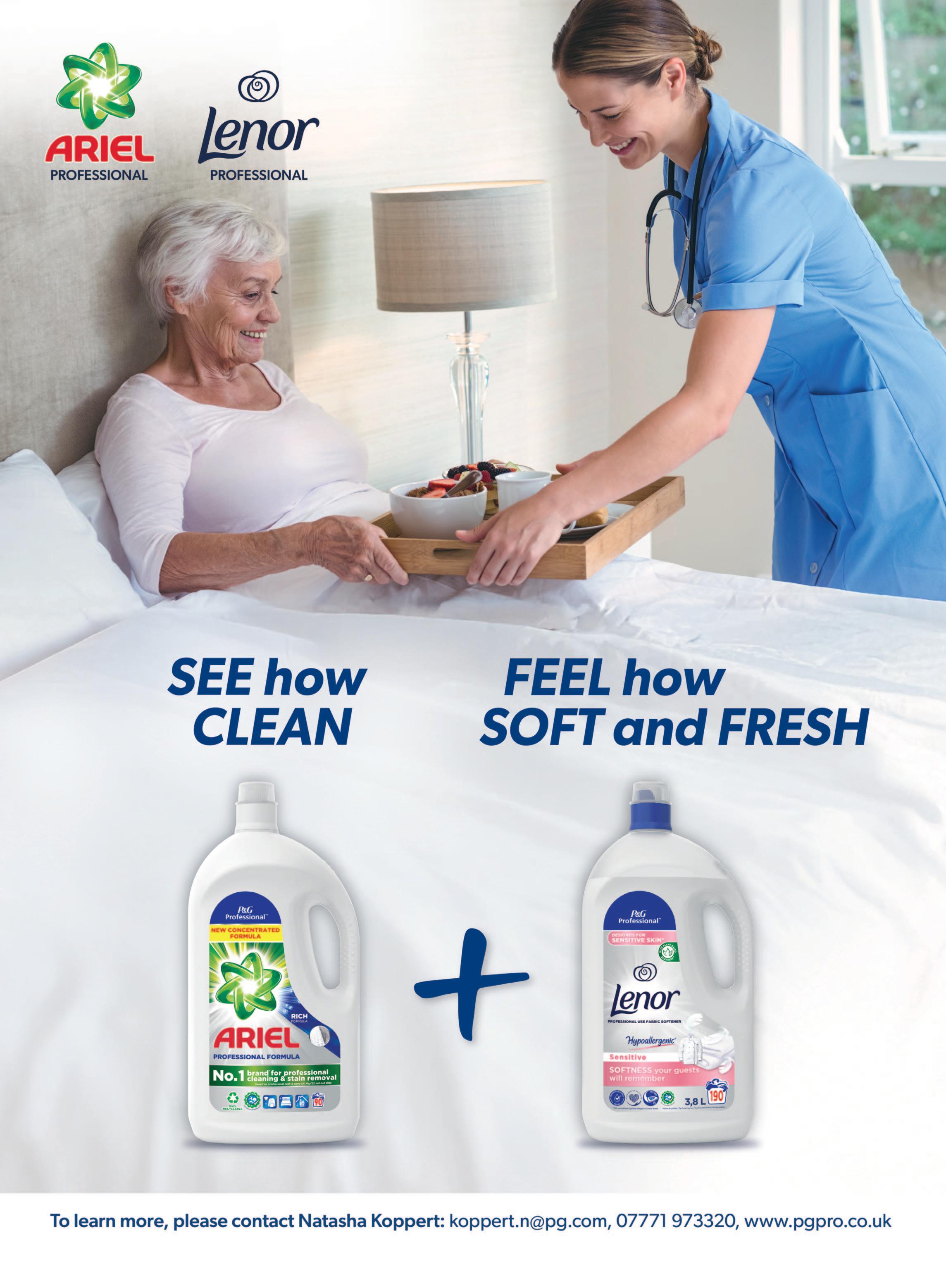















The UK Government has unveiled plans to establish a new independent commission dedicated to addressing the pressing challenges within adult social care and formulating long-term reform strategies.
The commission will provide a blueprint for a revitalized care system designed to meet current and future demands, aiming to "build consensus" for a proposed National Care Service and will be based on “uniform national standards, ensuring consistent and equitable care provision across the country.”
The initiative aims to engage care recipients, families, staff, politicians, and representatives from public, private, and voluntary sectors to shape a robust framework for adult social care.
Alongside the announcement, the Department of Health and Social Care has pledged a series of other changes to adult social care, including:
• As reported in the Autumn Statement, Increasing the 2024-25 budget for the dis-
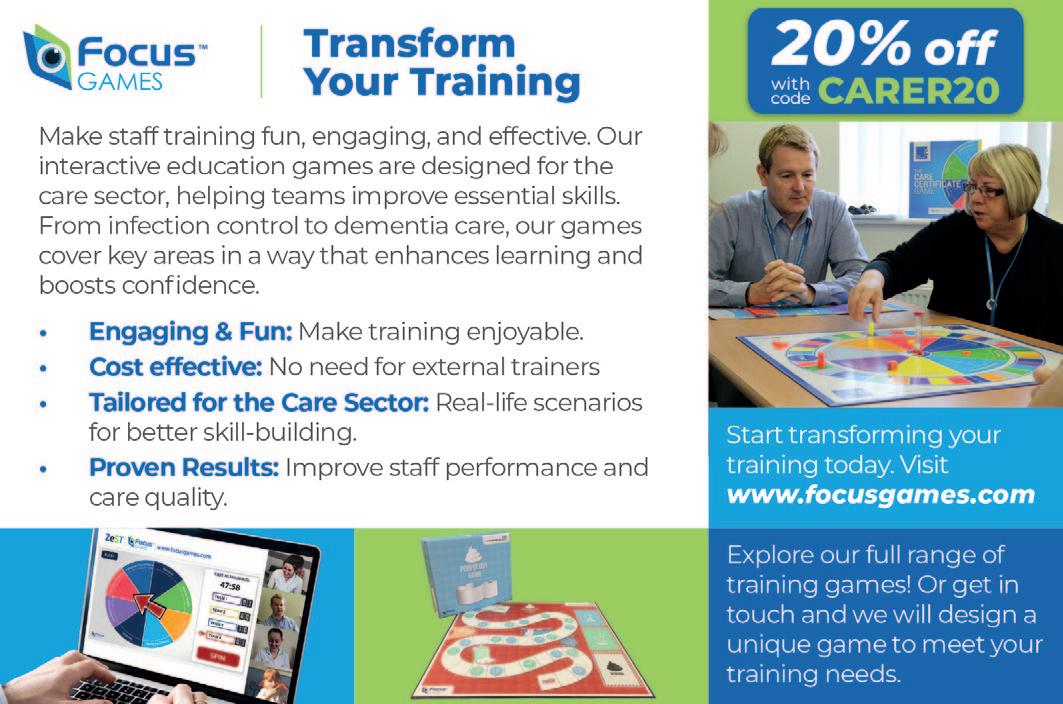
abled facilities grant (DFG) by £86m, to £711m, to fund more home adaptations for disabled and older people to enable them to remain independent for longer.
Skilling up social care staff to carry out more health tasks, such as blood pressure checks, to reduce the need for people to travel to NHS settings.
Developing a shared digital platform for health and social care to enable staff to share information in a timely fashion.
• Creating national standards and guidance on the use of technology in social care to enable people needing care, families and providers to choose the most effective and safe tools.
Reforming the Better Care Fund – which pools a portion of NHS and local authority budgets – to focus it on tackling emergency admissions, delayed discharges and admissions to long-term residential care.
(CONTINUED ON PAGE 3...)


Editor Peter Adams
As we welcome 2025, we want to extend our warmest wishes to all our readers for a Happy New Year. We hope this year brings joy, health, and success to all who tirelessly dedicate themselves to the care and well-being of others.
A big thank you to all the care homes that participated in our annual Christmas Tree competition! The creativity and effort on display were truly heartwarming.
Congratulations to Linden House Care Home in Wellington, Somerset, whose beautifully decorated tree, adorned with handmade decorations created by residents, won this year’s top honours (see page 11) Your efforts captured the true spirit of the season—community, creativity, and joy. For those who haven’t yet seen it, Matt from our graphics team has curated a wonderful selection of entries on a special page in this issue.
As we reflect on the challenges faced by the social care sector, the government’s announcement of an independent commission on social care reform has sparked considerable debate. While reform is long overdue, the decision to delay any meaningful action is deeply concerning. The Government’s pledge to postpone a social care overhaul until 2028 compounds the uncertainty in a sector already in crisis.
This is yet another instance of critical discussions yielding little immediate action. Mike Padgham, CEO of an independent care group, astutely highlighted the risks: “What happens to the recommendations if the Government doesn’t get a second term?” a very fair question.
It has been 14 years since Andrew Dilnot’s Fairer Care Funding report promised transformative changes, yet we find ourselves in a worsening situation. The delays are inexcusable. Every passing year exacerbates the strain on providers, staff, and, most importantly, the individuals and families relying on social care services. We urge policymakers to treat social care reform as the urgent
Carer is published by RBC Publishing Ltd, 3 Carlton Mount, 2 Cranborne Road, Bournemouth, Dorset BH2
damage. Views expressed within this publication are not necessarily those of the publisher or the
responsibility for any effects, errors or omissions therefrom. All rights reserved, reproduction is forbidden unless
national priority it is.
On a brighter note, we were thrilled to interview renowned broadcaster Angela Rippon, who, as an ambassador for the Alzheimer’s Society, is leading The Big Dementia Conversation. This online advice hub is a vital resource, sharing real-life experiences to support those caring for someone with dementia. Like Angela, I have personal experience with this devastating disease, having lost my mother to it.
Preparing for the interview gave me a moment to reflect on the profound impact dementia has on families and the economy, with projections showing a 43% rise in affected individuals by 2040 and an economic burden of £90 billion.
However, there is hope on the horizon. Last week, we reported on a groundbreaking new treatment for Alzheimer’s disease—Hydromethylthionine mesylate (HMTM)—developed by Aberdeen-based TauRX. This daily oral medication, which targets a key protein associated with the disease, could soon be available on the NHS.
Excitingly, it has already shown promise, offering quality years to patients involved in clinical trials. A healthcare professional in Singapore recently emailed me to share how her mother, who was part of the clinical trials in 2018 benefited greatly from the treatment, enjoying six meaningful years of life before her peaceful passing in 2023.
This potential breakthrough underlines the importance of continued investment in research and innovation, not just for dementia but for the entire spectrum of neurodegenerative diseases.
As we start the year, let us remain hopeful. Despite the challenges facing the care sector, the resilience, compassion, and ingenuity of those working in social care never fail to inspire us. At The Carer, we remain committed to shining a light on the incredible work being done across the UK and advocating for the reforms and resources the sector so urgently needs.
Here’s to a year of progress, innovation, and, above all, care. Thank you for your unwavering dedication, and once again, Happy New Year!
I would also like to encourage our readers to sign up for our bi-weekly digital newsletter at www.thecareruk.com and follow us on social media for all the latest news.
I can always be contacted at editor@thecareruk.com


A VISION FOR THE FUTURE
Health and Social Care Secretary Wes Streeting emphasized the importance of building a care system fit for the 21st century. “This commission represents an opportunity to forge a consensus around a National Care Service that will serve people with dignity and fairness for generations to come,” he stated.
Streeting also extended an invitation to opposition parties, encouraging cross-party collaboration to ensure the longevity of the care reforms. He praised Baroness Casey’s extensive experience in public service reform, describing her as the ideal choice to spearhead this transformative effort.
The Health Secretary said: “In the first six months of this government, work has already begun on stabilising the care sector, investing in prevention, and in carers and care workers. The investment and reforms we’re announcing today will help to modernise social care, get it working more closely with the NHS, and help deliver our Plan for Change. But our ageing society, with costs of care set to double in the next 20 years, demands longer term action.”
“The independent commission will work to build a national consensus around a new National Care Service able to meet the needs of older and disabled people into the 21st century.”
“I have written to opposition parties to invite them to take part in the commission’ work, and asked Baroness Louise Casey to build a crossparty consensus, to ensure the national care service survives governments of different shades, just as our NHS has for the past 76 years.”
“We are appointing one of our country’s leading public service reformers, and Whitehall’s greatest do-er, to finally grasp the nettle on social care reform.”
BUILD CONSENSUS
Baroness Louise Casey of Blackstock said: “Millions of older people, disabled people, their families and carers rely upon an effective adult social care system to live their lives to the full, with independence and dignity
An independent commission is an opportunity to start a national conversation, find the solutions and build consensus on a long-term plan to fix the system. I am pleased the Prime Minister has asked me to lead this vital work.
POLITICAL POINT-SCORING
Minister of State for Care Stephen Kinnock said: “Previous attempts to reform adult social care have failed due to a destructive combination of party political point-scoring and short-term thinking.”
“Baroness Casey’s commission will build cross-party consensus, and will lay the foundations for a National Care Service that’s rooted in fairness and equality. It will tackle both the immediate issues and the fundamental challenges that must be addressed if we are to get our adult social care system back on its feet and fit for the future.”
The commission’s work is set to commence in April 2025 as part of the government’s broader Plan for Change. This comprehensive initiative seeks to modernize health and care services while addressing immediate challenges such as reducing waiting times.
WELCOME MEASURES
Mike Padgham, Chair of the social care provider organisation, The
Independent Care Group (ICG), said: “We welcome the measures announced today (January 3), especially those that help people remain independent in their own homes.”
“And we have argued for some time that social care staff should be able to undertake the kind of health checks and treatments that are highlighted today, as it makes sense for them to be done by staff who are working with people every day rather than waiting for a doctor or nurse to visit.”
“My concern over this measure, is that if it isn’t supported by more funding to social care, it will heap further pressure on staff in a sector that is already straining under the pressure and working with 131,000 staff vacancies.”
“After 30 years of neglect, social care sector is on its knees and my biggest disappointment from today’s announcement is the timetable for major reform.”
“We have to wait until mid-2026 before first stage reporting from the commission and then no doubt it will take time to implement the reforms.”
“Then the second phase reports in 2028, again a long way down the road and perilously close to another General Election. If the Government doesn’t get a second term, what happens to the recommendations?”
“The sector has had enough of reports, we need to see urgent action. We might not have all the perfect solutions at hand, but we can’t have utopia and we need to make a start. In the past 20 years we have had five health secretaries and 18 ministers and in that time, eight green papers, four white papers, two inquiries and numerous other reports.”
“I can see why the Government would want cross-party consensus on this, but my fear is that it might just add further delays, which I suspect is what has happened in the past.”
“We need to see a true National Care Service, with health and social care merged, better pay and conditions for social care staff – on a par with their NHS counterparts – and an immediate injection of cash into social care, with £2bn widely regarded as the minimum needed, with some of that switched from the NHS.”
“We cannot fix the NHS without fixing social care first and we cannot wait until 2026 and beyond for that reform to begin.”
CAN’T WAIT UNTIL 2028
Catherine Needham, Professor of Public Policy and Public Management at the Health Services Management Centre, University of Birmingham said: “Wes Streeting’s announcement that the new social care commission will not report until 2028 is disappointing for two reasons.”
First, we know the issues and potential reform options already. Reforms to deal with rising demand for social care have already been pored over by several commissions, reviews and inquiries. All of the routes to improving quality, capacity and affordability in social care are expensive and potentially unpalatable to the Treasury. One of these options must be chosen, but there is no need to go back to first principles and spend three years coming to a conclusion.”
“Second, the timing of 2028 is politically risky. Since so much work has been done on the policy options already, the priority is to get the politics right. Whilst a commission with cross-party support might seem like a step in the right direction, 2028 is too near the next general election. A cross-party recommendation for e.g. tax rises will fall apart rapidly as an
election approaches. We know that funding reforms for social care have been seen as vote losers for parties in previous elections. Reform needs to be attempted when the government’s political capital is at its highest, i.e. in the first two years after an election.”
“Funding reform for social care has been passed into legislation twice in recent years (in 2014 and 2021). Both times it has been abandoned due to concerns about the political risks of introducing new tax or national insurance liabilities. Political courage is needed to hold the line and ensure that a new set of proposals is implemented, and that courage needs to come soon.”
MEANINGFUL
James Arrowsmith, Partner specialising in social care at UK and Ireland law firm Browne Jacobson, said: “The Casey Commission's approach is commendable. Engaging with the public, stakeholders, and political parties to build consensus around the future of social care could be a step towards delivering meaningful system wide reform. This dialogue can serve as a foundation for developing a vision that addresses the sector's challenges, including funding, workforce issues, and the integration of health and social care services. As Sarah Woolnough, Chief Executive at The King’s Fund has commented: ‘This could offer a real opportunity to break the cycle of failure to reform social care’.”
“However, it is imperative that this commission does not slow ongoing improvement efforts. The sector is currently facing significant pressures, including funding shortfalls, workforce challenges and the increasing demands of an ageing population. Immediate actions, such as investment in workforce development and the integration of technology and data sharing, are crucial steps that cannot wait. The announcement makes clear that at least some work, including on data, will be undertaken in parallel and if the commission can achieve early focus on other areas capable of rapid implementation, this will support ongoing parallel policy development and implementation.”
“As the Casey Commission moves forward, it is essential for leaders within the social care system to actively engage with their teams, service users and other stakeholders. Developing a narrative for the commission and investing in the relationships necessary for implementing change are critical components of this process. The sector cannot afford to wait until 2028 for reforms to materialise. Instead, it must continue to push for immediate improvements while also contributing to the national conversation.”
BUILDS ON PROGRESS
Michelle Corrigan, Director of Digital Care Hub said: “Digital Care Hub welcomes the early focus on technology and data sharing in the Government’s plans to transform adult social care. We know that tech and access to up-to-date digital records improve both the quality and efficiency of care. Today’s announcement builds on recent progress with record numbers of care providers now using digital technology.
“As the provider-led body supporting the sector with tech and data sharing, we look forward to working with the Department of Health and Social Care on these crucial developments. We will continue to put the case that the cost of introducing, implementing and maintaining digital tech must be factored in to the commissioning of care services. It is a business necessity – not an optional extra.”

By René Spoors, Senior HR Advisor at Croner-i

The introduction of the new Employment Rights Bill brings significant change for workers across various industries in the UK. However, its implications are particularly important for the social care sector. The Government has pledged that the reforms contained within the Bill will improve working conditions, enhance job security, strengthen employee rights and address the needs of an increasingly vital workforce. However, with the sector facing ongoing challenges such as staff shortages, low pay and high turnover, will it prove to be a help or a hinderance?
To help determine that, let’s explore some of the key provisions of the new Employment Rights Bill, assess how the changes will impact social care professionals and employers, and what they will mean for the future of the care industry in the UK.
ZERO HOUR BAN
Nearly a quarter of social care workers are employed on zero-hour contracts – a far higher proportion than the rest of the UK workforce, which sits at around 3%. One of the key changes proposed in the new Bill is the removal of the “one-sided flexibility” these contracts provide, to better safeguard workers’ rights.
The most significant impact of this change, for the care sector, will be the requirements for notice and compensation, as short notice changes can be high due to the nature of the work. For example, in domiciliary care, clients care needs can change quickly e.g. if they’re admitted to hospital. This will need to be managed as there’s unlikely to be much room in the budget for paying out if the shift needs to be cancelled. It’s unclear right now what enforcement will be put in place, but failure to meet the new requirements could result in claims from employees.
The nature of care sector work also means that workers requesting to move to a more consistent contract could create difficulties for care sector employers, as once an employee is on a guaranteed hours contract, they must be paid for these hours even where the work is not available. This is likely to increase costs.
A move to modernise the Trade Union legislation is another feature of the Bill, with many new measures designed to create more favourable conditions for Trade Unions. Some of these measures may have an outsized impact on the social care sector, including paid time off for union reps. The new legislation will enable employees to undertake training to become a union rep and attend to union duties, such as acting as a companion in a disciplinary hearing, on company time. This could encourage more union involvement with care sector employers, which can add some complexity to staff negotiations and will require skilled handling of the relationship. Not all managers will necessarily have experience of managing unionised employees, so might need additional training or support. Contracts may also need to be updated. At this stage it is unclear what the implications of not doing this will be. Employers will need to monitor progress of the Bill through parliament closely and update contracts and processes as needed to avoid the risk of tribunal claims.
With additional Trade Union rights comes changes to unfair dismissal protocols. The government has proposed making unfair dismissal a day one right with the provision that a nine-month statutory probationary period will allow a “lighter touch” procedure to be followed. This means that dismissing an employee in the probationary period without giving reasons and evidence to back them up will likely no longer be possible. Employers will need more robust processes before dismissing an employee, as they will no longer be able to rely on short service as a means for quicker dismissal.
Businesses may want to look at overhauling their hiring practices to factor in reducing the risk of making the wrong hire. Getting this wrong could open the doors to unfair dismissal claims from short service employees. Whilst the finer details are still unclear, employers need to be aware of the significant added risk that will come when dismissing employees, ensuring that proper policies and procedures are in place. If in any doubt, seek advice before moving to dismiss any employee.
Similarly, the Bill will give all employees the right to sick pay from the first day of sickness, regardless of earnings. This means it is imperative for employers to monitor sickness absence so they can ensure this does not result in an increase in absenteeism. Employee wellbeing will also be important. Employers will want to put measures in place to both support employees and prevent sickness, but this will involve an investment of both time and money. Failing to pay SSP isn’t grounds for a claim on its own, but it could be considered an unlawful deduction of wages, which is a claim that can be brought to tribunal.
Non-compliance with SSP regulations may also trigger a HMRC investigation, potentially leading to financial penalties or additional costs. This can also affect the employer’s reputation and, in turn, its ability to tender for new work.
The Employment Right’s Bill will establish a sector-wide negotiating body responsible for negotiating an industry-wide minimum wage for the entire social care sector. Currently no clear commitments to additional funding for the sector have been announced, raising concerns about how this would impact smaller employers in care, or those who receive little or no government assistance.
Bereavement leave, Parental and Paternity leave changes
Whilst many employers will offer employees time off in the event of a death of a family member, the new Employment Rights Bill proposes to create a legal right to bereavement leave. While the specific provisions will be outlined following a period of consultation, we do know that the duration of the leave is likely to be at least one week, or two weeks for the death of a child. However, currently, statutory parental bereavement leave is paid where a child under the age of 18 has died and there are currently no proposals to change that. What is not clear at this stage is whether this will be paid or unpaid leave. Although the changes would give employees time away from the workplace to grieve, unpaid leave could potentially be a source of financial uncertainty for those who choose to take bereavement leave. While making it paid leave could bring additional pressures for employers.
As the Bill works its way through parliament, it is crucial for care sector employers to understand how it enhances employee protections against unfair dismissal, strengthens job security and addresses the ongoing issues of work conditions and pay transparency within the care industry. While the Bill certainly has the potential to improve the quality of care received by vulnerable individuals as well as the quality of work for care staff, consideration of the sector-specific needs is required for the intended changes to be successful.
As we begin a new year, it’s a great time to reflect on the past and hear from those who’ve lived through many years and have valuable insights to share.
Some residents of Orchard Care Homes in the Sunderland area have offered their words of wisdom to inspire the younger generation in 2025 and beyond.
At Lansbury Court Care Home in Sunderland, Jean, 80, who has four children and worked in the equine industry, encourages others to "be nice to each other."
Jennie, 95, who grew up in Hendon, had two children, and worked as a tailor making uniforms for soldiers, believes young people should "help each other and be good."
Hazel, 79, who grew up in Southwick, has four children and worked in social services, advises, "Keep working hard at your jobs."
Norma, 95, from Fulwell and Roker, who has three children and worked at her local cinema and the food counter at British Home Stores, shares her wisdom: "Be kind to people and never hold a grudge."
Finally, Malcolm, 70, from Thorney Close, a former councillor with two children,


says, "Tolerate each other regardless of gender, race, ethnicity, and other differences. We share one world and should live together in harmony."
Over at Archers Court Care Home in Farringdon, near Sunderland, residents were also sharing their advice.
an, 81, who grew up in Sunderland and has two children: “I would tell them to get a good job.”
Michael, 72, grew up in Sunderland and has three children and two grandchildren. His wise words were: “Always keep your promises and love your family, near or far.”
Finally, Esther, 75, said: “Don't give up on your dreams.”
A trio of residents at Ashlea Lodge Care Home in Sunderland added their views. Margaret 79, said: “Cherish and find happiness within your family.”
Sylvia, 86, added: “Live better and get off your phones!” Tom, 89, said: 'Work hard and enjoy your life.”
The UK Government is introducing measures to empower care workers with new training to perform routine health checks, including monitoring blood pressure, managing diabetes with insulin administration, redressing wounds, adjusting catheters, and offering mental health support. These steps aim to enhance access to routine care and alleviate the growing backlog within the NHS.

Under the new plan, care workers will be authorised to deliver specific health interventions, ensuring faster access to care and improving patient experiences. Health Secretary Wes Streeting highlighted the benefits of these changes, stating they would “free up hospital beds” and reduce the need for patients to repeat their medical histories to multiple healthcare professionals.
National Standards and Digital Integration.
As part of the reforms, the government will establish national standards and guidelines to help care providers invest in advanced technologies that support patients effectively. The initiative forms a key component of broader adult social care reforms and plans to strengthen integration between the NHS and the social care sector.
One significant aspect of the strategy involves the development of a unified digital platform to facilitate seamless data sharing between social care, GPs, and hospital staff. The aim is for all care providers to be fully digitised by 2029, granting care workers real-
time access to comprehensive medical records.
Revolutionising Care with Technology Health Secretary Streeting described the initiative as transformative:

“There is a revolution taking place in health and care technology, and this government is reforming social care so disabled and older people benefit from the latest cutting-edge tech.
Patients won’t need to repeat themselves, staff will be equipped to deliver the best possible care, and hospital beds will be freed up to tackle other pressing needs.”
Dr. Vin Diwakar, National Director of Transformation at NHS England, echoed this sentiment, highlighting the benefits of digital integration:
“Research shows that digitising social care and linking up records helps people live independently for longer, enables families to be more involved in caregiving, and frees staff from administrative tasks, allowing them to focus on providing care.”
These reforms are expected to modernise the social care sector, fostering better communication across healthcare systems while improving patient outcomes. By equipping care workers with the skills and tools to perform routine health tasks, the government aims to ensure that social care remains a cornerstone of community well-being.
These initiatives are designed to integrate services, reduce pressures on the NHS, and deliver a more responsive and patient-centred care system.
Join us as we explore the critical steps for purchasing Social Care tech that will future proof your operations for 2025 and beyond.
Tailored to leaders in HR, Finance, and IT, this webinar will explore how to futureproof your operations by integrating Scheduling, HR, and Payroll systems to streamline workflows, enhance compliance, and significantly reduce costs.

Hemal Joshi, Sona’s Head of Sales, to share insights on selecting Scheduling, HR, and Payroll solutions.
We’ll be discussing:
How top Social Care leaders are purchasing tech in 2025
Wednesday, 22nd of January 12PM (GMT)
Ruth Hallett, Head of Change at United Response and Social Care tech consultant, joins Debbie Price, CEO of Coverage Care Services, and
Future-proofing care providers’ tech stacks, as Ruth draws on her extensive experience and current work at United Response.
Key pitfalls and lessons from navigating the WFM tech selection process, as Debbie has recently done for Coverage Care Services.
Practical advice on maximising system value, as Hemal has supported various other providers to achieve.

WE NOW SUPPLY A WIDE RANGE OF FURNITURE

By Avinav Nigam, founder of TERN (www.tern-group.com)

The UK government has recently intensified efforts to combat the exploitation and abuse of overseas workers, particularly within the healthcare sector. Employers found guilty of serious offences, such as violating visa regulations or mistreating staff, now face stringent sanctions, including extended bans on hiring international talent, substantial fines, business closures, and potential prosecution. [GOV UK] CURRENT LEGISLATION AND EMPLOYER OBLIGATIONS
Employing overseas workers in the UK requires strict adherence to immigration laws and employment standards:
• Sponsor Licence: Employers must obtain a sponsor licence to hire non-UK residents. This process involves demonstrating the capability to manage sponsorship duties effectively, including maintaining accurate records and reporting significant changes.
• Right-to-Work Checks: Employers must verify that all employees, including those from overseas, have the legal right to work in the UK. This involves checking and retaining copies of relevant documents, such as visas or residence permits.
• Employment Rights: Overseas workers are entitled to the same employment rights as domestic employees, including receiving at least the National Minimum Wage, adhering to Working Time Regulations, and ensuring safe working conditions. [EBS Law] RECENT GOVERNMENT CRACKDOWN
In response to ongoing concerns about the mistreatment of migrant workers, the UK government has introduced stricter measures.
Starting with extended bans, employers who repeatedly violate visa rules or commit serious employment breaches, such as failing to pay the National Minimum Wage, will face bans from hiring overseas workers for at least two years, doubling the previous maximum sanction period.
The government is also targeting unethical practices, such as charging skilled workers for the cost of sponsorship, to protect vulnerable employees from exploitation.
Employers who fail to comply with these regulations may face severe penalties. Civil penalties can be imposed, with fines reaching up to £60,000 per worker for repeat offences. Authorities have the power to close businesses found to be employing illegal workers or violating employment laws. Serious breaches can lead to criminal charges, resulting in imprisonment for employers who knowingly hire illegal workers or engage in exploitative practices.
The healthcare sector, facing significant staffing shortages, has increasingly relied on international recruitment. However, this dependence has, in some cases, led to the exploitation of migrant workers. The government's crackdown aims to ensure that healthcare employers adhere to ethical recruitment practices and treat all staff fairly.
Employers in the UK healthcare sector must address talent shortages while ensuring compliance with immigration and employment laws. This requires ethical recruitment practices, upskilling staff to meet job requirements, and supporting overseas workers through migration and integration. These measures meet legal obligations and create a fair and supportive working environment.
Looking for a platform that helps employers achieve these goals through a comprehensive system designed to simplify upskilling, manage migration processes, and support the placement of skilled healthcare professionals is advantageous. Organisations can confidently navigate the complexities of hiring international talent by using structured systems like this, ensuring compliance and promoting ethical employment standards.
As the government enforces stricter measures against non-compliance, employers must remain proactive in meeting their obligations to avoid penalties and contribute to a fair and ethical workplace for all staff.
In light of stricter government measures, compliance with immigration and employment laws is no longer optional but essential for businesses relying on overseas talent. Employers in the healthcare sector must embrace ethical recruitment practices, ensure fair treatment of all staff, and proactively address legal obligations to avoid severe penalties.
You should do it for your business and, most importantly, human rights.
Nature-loving residents of a Dorset dementia care home have helped compile a 2025 calendar featuring photos of animals, birds and insects venturing into their garden.
Badgers, squirrels, foxes, bees and blue tits are among the stars of the collection which The Aldbury in Poole is selling to raise funds for its nominated charity, Dorset-based Wildlife in Need.
The images were captured using a webcam installed in the grounds of the Colten Care home in summer 2024, revealing the wildlife goings-on day and night.
Much activity has taken place in and around a bug hotel and hedgehog home specially built and furnished by members of The Aldbury’s weekly garden club with expert advice from charity representatives.
As well as still images, the webcam provides live footage of visiting wildlife which can be enjoyed whatever the weather from the comfort of the lounge and bedrooms, a particular benefit for those residents with mobility needs.

Companion Melissa Siat said: “We’ve been blessed with some amazing pictures and had always planned to create a photo album and possible calendar we could sell in aid of Wildlife in Need.
Social Care TV continue to fly the flag for highest quality online training for Health and Social Care, after unwavering commitment to excellence within the sector for over 25 years.
Their widely-used health and social care specific courses - produced and edited in-house - are expertly designed to make learning engaging, informative and, therefore, highly effective for learners.
Accredited by CPD and endorsed by Skills for Care, training with Social Care TV is quality assured, comprehensive and relevant.
As one of the leading online training providers in the health and social care sector in the UK, they supply training for local authorities, recruitment agencies, care home groups and other health and social care organisations.
Their feature-rich Manager platform has further been enhanced this year with the introduction of several new Manager tools designed to aid with compliance, reporting and trainee management. Features now available include:
• Compliance Dashboard with Traffic Light System
• Downloadable Trainee Matrix
• Custom Bundles
• Trainee Groups
• Bulk Uploads
“The best photos were chosen by residents themselves including Terry Pattison, Joyce Holden and married couple Tony and Pam Husband.
“Among the shots are a robin feeding outside Stella Anderson’s window, blue tits nesting, a naughty squirrel stealing our bird food, a badger and fox behind our summerhouse, bees pollinating, chickens rescued by Wildlife In Need and our friendly hairdresser’s dog Roxy!
“Residents received free copies of the calendar as a Christmas gift, and it is now on sale with all proceeds going to Wildlife in Need. “More than £100 has been raised already and everyone is so happy that it’s benefiting such a good cause.”
Resident Terry said: “There is more happiness in giving than receiving.”
Wildlife In Need is a local wildlife rescue charity run and led by volunteers who offer expert care and advice in relation to injured animals and birds.
Calendar sales to staff and residents coupled with proceeds from galas and other events have enabled The Aldbury to raise more than £900 for Wildlife in Need.

• Bulk Enrolment Onto Custom Bundles
• Course Enrolment Notifications
• Course Reminders
SCTV regularly release new and updated high-quality courses. Previews for all courses can be viewed at: Courses - Social Care TV (www.social-care.tv/courses/course-details)
To enhance their learners' experience further they have created free, comprehensive subject-specific workbooks which were rolled out across all courses this year. This unique addition provides excellent value and a fully robust training package.
SCTV are delighted to have won several awards over the last 12 months including:
• Best Online Health and Social Care Learning Platform’
– Global Health & Pharma Social Care Awards 2024
• ‘CPD Provider of the Year’ – The CPD Awards
• Social Care Training Provider of the Year’ - Corporate Livewire Innovation & Excellence Awards
Gold standard customer service remains a core staple of the business, with expert support and guidance provided via telephone, email and live chat. They place great importance on the training and development of their customer services team to ensure that they continue
to provide a personal, friendly and knowledgeable service.
Their much-loved ‘Care Worker of the Month’ award recognises and rewards the selfless dedication shown by care workers across the UK and they proudly support the Care Workers Charity who aim to advance the financial, professional and mental wellbeing of social care workers.
SCTV believe that high quality training should be accessible to all and offer regular, free courses which include a digital certificate accessible via their website.
The company stands behind a clear mission and set of values which define their ethos and their dedication to both the Care Sector and those within it. These can be viewed at: Mission Statement and Core Values - Social Care TV
(www.social-care.tv/about/mission-statement-and-core-values)
Social Care TV are a responsible business, committed to ensuring that their actions have a positive impact on their employees, customers, the wider health and social care community and the environment.
Above all, SCTV consistently strive to make a meaningful contribution to the wellbeing of those being cared for.
For more information please see: Homepage - Social Care TV (www.social-care.tv) and see advert on the facing page.
Following last week’s, announcement of an independent commission for reforming adult social care, chaired by Louise Casey, the County Councils Network (CNN) has said that the review must include input rom them in order for it to be a success. Split into two phases, this cross-party commission will report firstly in mid-2026 and then will set out a longer-term plan ‘by 2028’.
Cllr Martin Tett, Adult Social Care Spokesperson for the County Councils Network, said: “Over the last two decades, wholescale reform of adult social care has never materialised due to unfunded costs and a lack of cross-party support, so efforts to create a long-term plan for reform that has a national consensus are laudable. But in order for reform to be a success, it is vital that the voice of local government, which really understands the issues to be debated, is prominent in this review, and social care remains a local service when the National Care Service is created.
“Social care is complex and frequently misunderstood. It is not just about who pays the care costs of the elderly; it includes the many working age adults with special needs who constitute two thirds of a typical council’s commissioned social care expenditure and also includes the NHS and their responsibilities for support in and outside hospitals. Therefore, it is imperative that this review looks to address all parts of the social care system. This means it must have a wider scope than just looking at care costs for individuals who are not eligible for state care. The review must also
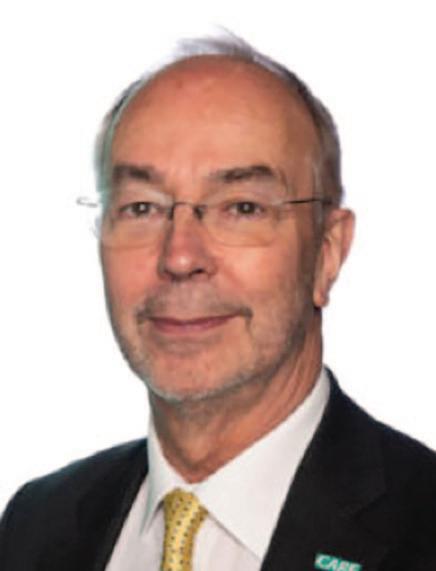
consider how any new ‘national’ system would deliver better national standards, and the workforce required.
“With the purpose of the National Care Service vague and ill-defined at present, the financial pressures on councils are intense and growing and so our members are clear that their number one priority is sustainable funding for social care alongside a long-term workforce plan.
As our ‘Manifesto for Counties’ set out, councils must remain at the heart of delivering services, structural changes that are unnecessary and bureaucratic must be avoided, and reforms should develop community care and create more housing with social care at its heart.
“Importantly, we are concerned over the timescales announced today which mean that vital changes will not be introduced for at least three more years.
With adult social care under significant pressure at the moment, the system is likely to deteriorate further by 2028 so it is imperative that next year’s Spending Review provides long-term resource for councils to stabilise the system and ensure that the preventative focus of this review becomes a reality, otherwise the National Care Service could fall at the first hurdle.”
Residents at The Cedars Care Home in Bourne launched their very own weekly Happy Hour this week, right in the comfort of their own home. The Cedars bar has a range of drinks to suit every taste; including wines, a selection of beers, gin, whisky, martini, rum, sherry and Baileys; with non-alcoholic versions and cold drinks also available. With traditional mixers and a cocktail shaker, staff were able to create residents favourite tipples; followed by a sing-a-long to our favourite pub songs, including ‘My Way’ and ‘The Young Ones’. Residents and family joined in with the party, and sang along to the music; whilst enjoying the pub atmosphere. A lively discussion of favourite drinks and pub meals rounded off a perfect afternoon.

Senior General Manager, Rebecca Aldred said, “Our residents and guests are looking forward to their weekly happy hour here at the home. When residents make requests, we are always happy to accommodate; and a chance to have a drink and chat is one that we all enjoy. We do our best to provide a wide range of activities and entertainment at The Cedars Care Home as part of the lifestyle enrichment programme for residents. This welcome addition to our regular programme is sure to be a popular one!”
Resident Maureen Ireland said: “This is wonderful. It’s so nice to be able to choose a drink and enjoy it in company. I’m first in line next week! Thank you”.


For too long, the challenges faced by the social care sector have been a secondary thought. So, the recent news that there will be a review into adult social care in England, which will provide recommendations on how to improve the sector, was a welcome demonstration that this government is taking the massive challenges and hardships faced by the social care sector seriously.
Baroness Louise Casey, a former director general in the Home Office and Department for Communities and Local Government, has been appointed to lead the project, an appointment which everyone at the Healthcare Management Trust fully supports.
However, despite this positive step forward, I feel as if we’ve already taken two steps back. Waiting until 2028 for the full report and recommendations feels like a wasted opportunity, as the conclusions will almost certainly tell us what we already know and experience on a day-to-day basis – that we are underfunded, under-resourced, we need more innovation, and we need to work smarter to ensure we keep up with the ever-increasing demand for our services.
A review of lessons learned to date would be more helpful and provide a path of action to address areas of concern that will result in real-world change.
Nevertheless, we welcome the chance to work with Baroness Casey on the review. Despite the length of time it will take, we must see this as a positive opportunity to address the challenges across our sector and the way it is viewed.
There are philosophical and cultural differences that exist across healthcare and social care which must be recognised. The two industries are not the same and should not function the same way. We must stop setting the two sectors against each other and start treating them as equals in terms of value and place within our society. It sounds obvious, but the first way to do that is to address funding.
Already this winter, there has been a vast lack of capacity in hospitals due to limited places to discharge people so they can safely recover. Social care and the NHS rely on each other but the stark imbalance in funding, as demonstrated by the latest budget, sets them against each other.
By Dr Nichola Stefanou, Chief Executive of Healthcare Management Trust (www.hmt-uk.org)
The lack of funding in social care leads to a lack of resources and as such organisations will only be able to provide basic care provision. This care will be safe, but it won’t be able to offer patients reablement or rehabilitation that will actually improve health outcomes or quality of life. Instead, patients in the community are likely to deteriorate more rapidly, leading to hospital admissions.
It's a vicious cycle that needs to be broken. But doing that, requires a shift in perspective, which hopefully the Casey review will provide.
We must also remove the political prejudices about certain providers and be pragmatic with allowing independent providers to the table to help tackle challenges. The recent agreement to allow the NHS to make better use of the independent sector to tackle waiting lists as well as providing millions more appointments is a welcome step in the right direction. Currently, less than a quarter of patients recall being offered a choice of hospital for their treatment. It will help expand capacity and widen patient choice. I hope it will also encourage longer-term contractual relationships to be established, enabling further independent sector investment in NHS capacity, but also providing stability and security for the social care sector.
To those of us in the sector, this is seen as positive but public perception will jump to the conclusions of NHS privatisation. This is understandable so we must work harder to help people understand that, just because they receive their care in a ‘private hospital’ it is still an NHS service. Not-for-profit social care providers have a vital role in changing this perception, improving the sector and enabling it to grow. They have the ethical mission to reinvest any surplus into their services, whereas completely private organisations will put profit into the pockets of their shareholders. Funding these types of social care providers first will lead to better health outcomes for people.
The Casey review must also explore how the sector invests in our workforce and pride more meaningful career pathways. While the underfunding of social care hits patient care, it also hits our staff. According to Skills for Care, the sector needs an additional 540,000 workers by 2040. We must find ways to attract and retain people in this sector for the long term. Without urgent investment, the sector will fail to keep the talent needed to meet growing demand and instead perpetuate a growing feeling that social care workers are undervalued.
The social care sector’s future is uncertain, but what is true, is only by bringing all parties to the table and valuing each perspective equally will ensure the right improvements are needed in our vital sector. I just hope it’s sooner rather than later.
A Kent-based care home is striving to prove that age is no barrier to creativity, independence and community spirit.
Sonya Lodge Residential Care Home in Wilmington, Dartford, encourages an integrated, community-based approach, helping residents to still engage with their hobbies and interests.
One resident, Margherita, is currently teaching her fellow residents Italian, exploring everyday phrases such as days of the week, common greetings and even incorporating singing into her lessons. Designed to stimulate the mind and encourage social interaction, these sessions provide an exciting opportunity for residents to challenge themselves and immerse in a new culture.
The home also recently launched a new creative group, after Pam asked to start her own craft circle. Pam shared her skills by teaching others how to cre-

ate delicate roses out of tissue paper, which were used to decorate cards, as well as making a sign and wool baubles. The group offers a relaxed and supportive environment where participants can express themselves through creative mediums, enjoying the therapeutic benefits of crafting while building stronger relationships within the home.
John Hudson-Beddows, Home Manager of Sonya Lodge said: “We’re passionate about creating opportunities that help our residents feel fulfilled, connected, and empowered. Whether it’s learning a new language, picking up a paintbrush, or just sharing stories with one another, these activities are about much more than passing the time — they’re about building confidence, creating friendships, and celebrating the joy of lifelong learning.”
The pobroll® is the invention of Pat O’Brien, a physiotherapist, Moving and Handling trainer, and Conflict Management tutor with over two decades of experience in care homes and nursing homes
Care home managers often face challenges in delivering intimate care while balancing efficiency and managing costs, particularly when these essential tasks provoke behaviours that can be challenging to safely manage. Traditional methods—especially for bed-bound residents—often lead to lengthy processes and frequent linen changes, driving up costs and consuming valuable staff time. The pobroll® provides a transformative solution that supports dignified care, achieves significant cost savings, and reduces the need for additional staffing.
The pobroll® is an innovative bed-bathing wrap specifically designed to enhance comfort and dignity during personal washing for individuals who require in-bed care. Centred on the resident’s experience, it minimizes distress by providing sensory comfort. Crafted with two layers of high-quality cotton-terry toweling and a waterproof layer in between, it delivers a soothing, calming experience while keeping the bed completely dry. Sized for a standard single bed, the pobroll®’s dual-layer design offers warmth and a sense of security and privacy, allowing residents to maintain comfort and dignity during bed-based bathing routines.
The pobroll®'s waterproof design enables caregivers to provide a complete wet wash without the risk of soaking the bed, minimising the need for frequent linen changes. This leads to fewer laundry loads, reducing labour and utility costs, as well as wear on linens. By reducing logistical tasks, caregivers have more time to focus on direct resident care, enhancing productivity overall. Additionally, reduced reliance on disposable wipes results in further cost savings and supports environmentally sustainable practices.
With its durable, reusable design, the pobroll® maintains hygiene standards and allows for extended use across multiple residents. As care homes face increased pressure to adopt sustainable practices, the pobroll® provides an effective solution that supports both economic and environmental goals.

Managing resident agitation—particularly for those with dementia— often requires specialised training in restraint techniques. The pobroll® significantly reduces the need for physical intervention by providing a warm, secure covering that alleviates resident distress. This gentle approach minimizes aggressive or defensive reactions, reducing the number of staff needed for these interactions. As a result, facilities can potentially lower staffing levels without compromising care quality, yielding substantial cost savings.
Additionally, reduced dependence on physical intervention decreases training costs associated with restraint techniques. By simplifying the process of intimate care, the pobroll® reduces the need for specialised training, making onboarding smoother and lowering turnoverrelated training expenses.
ENHANCING SAFETY, COMPLIANCE, AND RESIDENT SATISFACTION
The pobroll® supports compliance with restraint reduction guidelines, helping facilities minimise documentation burdens and regulatory liabilities linked to physical interventions. This non-invasive solution
improves safety for both residents and caregivers, fostering a culture of dignity and respect that boosts satisfaction among residents and their families.
CONCLUSION: A VALUABLE ASSET FOR QUALITY CARE AND COST MANAGEMENT
For care homes, the pobroll® represents a strategic investment, offering measurable savings by reducing reliance on disposable products, lowering laundry and training costs, and enabling efficient staffing. Most importantly, it prioritises resident dignity and comfort, setting a high standard for compassionate, person-centred care. For facilities seeking to enhance financial performance and care quality, the pobroll® is an invaluable addition to their resources.
WHO CREATED THE POBROLL®?
The pobroll® is the invention of Pat O’Brien, a physiotherapist, Moving and Handling trainer, and Conflict Management tutor with over two decades of experience in care homes and nursing homes. Pat's focus has been on individuals who are frail, receiving end-of-life care, and often grappling with dementia-related challenges.
Throughout her experience of working alongside carers in Nursing and Care homes, Pat identified a common issue during personal care routines, particularly bed baths, where individuals with dementia would frequently experience distress, agitation, and discomfort, leading to compromised hygiene standards and heightened caregiver stress. Recognising the fundamental right to cleanliness and comfort, Pat embarked on a mission to devise a solution that could mitigate these challenges and enhance the overall care experience for all concerned. The result is the pobroll®, hailed as a “game-changer” for those requiring care in bed.
Selected as one of their 2023 Accelerator partners, the Alzheimer’s Society recognised the potential of the pobroll® to transform the bed bathing experience for individuals living with dementia and their families. Pat is currently being supported by the Alzheimer’s Society Innovation team as she moves forward with getting this new innovation to market.
There has been a substantial decrease in the number of Health and Care Worker visas granted in the UK over the past year, leading to fresh concerns over a social care workforce ‘crisis’.
Latest figures reveal an 65% annual fall in visa grants when compared with data from 2023, and follows the conservative government’s decision last year to ban direct care workers arriving from overseas from bringing dependents on their visa.
Government data reveals that there were just 13,131 Health and Care Worker visa grants between April to September 2024 – down from 80,541 grants in the same period the year before (-84%).
In total, 50,591 such visas were awarded in the year ending September 2024 – a 65% decrease when compared to 2023.
The number of Health and Care Worker visas had previously increased by 114,023 between 2021 and 2023, hit the highest point at 145,823 in the year ending December 2023.
However, the volume of visas issued to care workers and home carers has fallen since the latter part of 2023.
The decrease follows increased inspection from the Home Office to employers in the health and social care sector, and comes after measures were introduced to prevent social care workers from bringing dependents when they migrate to the UK.
Since March of this year, care workers have been unable to bring dependents with them to the UK.
Care England has expressed grave concerns at the new figures
This stark decrease, with grants falling by 84% between April and September 2024 compared to the same period in 2023, highlights the devastating impact of immigration policy changes on the adult social care workforce.
Professor Martin Green OBE, Chief Executive of Care England, said: “Behind these numbers are real people; compassionate and skilled individuals who want to care for others but are being shut out. The decision to ban health and care workers from bringing their partners and children to the UK last December was shortsighted and profoundly damaging. It sent a message that these
workers are welcome only for their labour, not as whole people with families and aspirations.
We are already battling a domestic workforce crisis, with 70,000 fewer British workers in the sector over the past two years. The pipeline of international recruits was keeping services afloat, but now even that lifeline is being cut off, and care providers are left scrambling to fill shortages, unable to deliver the amount of care they once could. How can we build a compassionate system when the workers at its heart are treated with such little regard?
We cannot solve the care crisis if we ask workers to leave behind their loved ones to come here. Restoring the right to bring dependants is not just the humane thing to do, it’s essential to attracting the workforce we desperately need. Let us ensure that those who care for others can also care for their own families.”
The ban on bringing dependants, introduced late last year, has created a two-tier system where NHS staff and other skilled workers can bring their families, but care workers, who are equally essential, are excluded. This disparity not only undermines recruitment efforts but further devalues the vital role of care workers.
CARE ENGLAND IS URGING THE GOVERNMENT TO:
• Restore the right for care workers to bring their dependants to the UK, acknowledging their essential role in society and treating them with the dignity and respect they deserve.
• Increase investment in the sector to enhance pay, working conditions, and career opportunities for both international and domestic care workers, creating an attractive and sustainable workforce.
• Establish a fully funded, long-term workforce plan for adult social care, integrating these reforms and more to secure the sector’s future and meet the growing demand for care.
“Care work is about connection and compassion. It’s time the government showed the same compassion to the people who make it possible,” Professor Green concluded.



At Bupa we’re all on a mission to get to net zero by 2040. People’s health and the health of the planet are intrinsically linked; we cannot be healthy if our environment isn’t healthy too.
The healthcare industry is currently responsible for almost 5% of global greenhouse gas emissions . In the care sector, we have the added challenge of keeping our residents warm, safe and well all year round and so we must consider things like heating, PPE and medications.
But while tackling emissions can seem like an insurmountable challenge, there are still ways that we can all go green and play our part. WHERE TO START?
A recent report by Bupa with The University of Manchester and The Tyndall Centre for Climate Change Research identified some recommended action areas. These include:
Supply chain – setting clear guidelines and standards with the providers and suppliers we work with to deliver our services sustainably: this can often be the largest part of a healthcare organisation’s carbon footprint. Greener buildings - whether they are modern, purpose-built care homes or historic period buildings, running each one takes a huge amount of energy. Updating them can be complicated and costly but it’s important to make investments today for a greener tomorrow.
Travel and transport – how our people and residents’ families travel to the home and how we transport our residents in an environmentally conscious way.
Clinical practice – how we can make the clinical pathways we provide for our residents and the services we deliver more sustainable. Technology can play a huge role in reducing our carbon footprint here.
Advocacy and engagement – arguably the most important factor: high quality governance and engaging our people and residents in the changes required to become more sustainable, so they can see the benefits for themselves and our wider environment.
These are action areas that apply across all of the healthcare industry, but the unique challenge in our sector is that we’re dealing with our residents homes, and accordingly they will always be our top priority. Any changes to their homes where they feel safe, well and comfortable must be carefully considered, minimising disruption and with the full involvement of them and their loved ones.
PUTTING RESIDENTS FIRST
Transitioning to greener ways of working may be perceived to bring short term upheaval. So, it’s really important that everyone understands why we are investing in the changes and that change is managed at a rate where residents’ needs continue to come first.
Open communication and clear timelines with residents and their loved ones can help people feel involved as well as having the chance to ask questions.
And although residents shouldn’t really notice any major differences while work is ongoing, a clear timeline can also help, and remember to leave time for each change to bed in before moving on. At Bupa we’re aiming to transition all of our homes to more green ways of working, but we know there’s a
By Rebecca Pearson, General Manager, Bupa Care Services
lot to learn on the way. So we’re lucky that one of our homes, Wykebeck Court in Leeds, has agreed to act as a vanguard for the project, becoming Bupa’s first net zero care home. Work is already underway to decarbonise the kitchen, update gas fuelled equipment with all new electrical appliances and upgrade the laundry and heating systems.
We’re involving residents and our people every step of the way, taking their ideas on board including the planting of new hedges and apple trees, as well as feeding boxes for squirrels to make sure the building work has minimal impact on the local wildlife. It’s really exciting and we’re taking the opportunity to document their journey, so that everyone can see what it takes to make a care home net zero.
BRINGING YOUR PEOPLE ON THE JOURNEY
In a sector where competition for people is fierce, we must engage our people, ensuring that they are fully bought in to our wider mission and can act as advocates.
It’s a good idea to lay the groundwork for how your organisation feels about the environment and give your people ways to get involved. Every year we run a Healthy Cities campaign which aims to get people moving more to raise money for local green causes such as forest schools, food banks and regenerating community spaces. Our people also have the chance to nominate local good causes for grants, so they can see how their action is making a difference in their local community.
Plus it’s all about getting moving and feeling healthier: Bupa Care Services people walked over 250 million steps in June, a huge achievement!
Colleagues often have lots of ideas that can help reduce our impact on our environment. Our people told us they wanted to spend more time doing what they love about their jobs: providing care. So we introduced electronic care records across all our homes, moving away from paper based systems. As well as being great for the environment, moving towards electronic systems for records, safety, and compliance, this helps drive better health outcomes, improves morale for our people.
We’re constantly pushing forward in this area and similarly to Wykebeck, we have an innovation-focused home, Queensmount, where our people and residents are ready and willing to try out any number of new apps, gadgets and interactive widgets that help us drive up our standards.
Technology also means more services can be provided remotely, such as GP appointments, and at Bupa we are unique in that we can bring in services from other parts of the business so that our residents don’t have to travel.
Following a successful pilot at Richmond Villages Aston, we are now providing our Bupa Health Clinics services to nine of our retirement villages. This means that residents are able to access virtual GP services and a 24/7 nurse-led healthline, on-site health assessments and earwax removal, all provided by the Bupa Health Clinics team, as well as discounts on dental services, including the Bupa Smile Plan from the comfort of their homes.
Ultimately, making a difference on climate change is something that none of us can do alone. If nothing changes, some expect that the healthcare sector’s carbon emissions could increase by 50% by 2050 . There are some amazing examples of progress from across our industry and there’s always more to learn.
In the meantime, making changes whether big or small are always worth doing. We can all make a tangible difference, making life better for our colleagues and residents while helping to make a healthier world for generations to come.
We are excited to share the heart-warming news that three of our dedicated football enthusiasts, Anita, Graham, and David, had their wishes granted with a remarkable experience at the live Poole Town FC match. In just a few days, their dream of attending a football game became a reality, filled with VIP treatment and exceptional hospitality. A dream come true for David as his special wish was visit a stadium and watch a live game.
Despite the chilly weather, our residents immersed themselves in the excitement of the game as Poole Football Club faced off against Bracknell Town, resulting in an exhilarating Nil-Nil draw. The residents wholeheartedly enjoyed every moment of the match, showcasing their unwavering support for the team.
Anita, Graham, and David were delighted to receive Poole Town FC scarves, adding to the sense of unity and team spirit. They had the privilege of meeting Ben, who provided them with top-notch care and atten-


tion throughout the event, ensuring they felt like valued guests .
Before kick-off, our residents were treated to tea and cupcakes, had the opportunity to meet a few football players, and engaged in memorable conversations about their shared passion for the game. Anita's anecdotes about watching games with her grandson struck a chord with the players, fostering special connections and lasting memories
During halftime, the residents returned to the hospitality lounge for a brief break before eagerly returning to catch the thrilling conclusion of the game. Anita, Graham, and David even participated in voting for the player of the match, who was the talented, Harvey Slade.
Ben Edgell, Commercial Manager at Poole Town Football Club who looked after the residents on the day, said “'Poole Town FC were delighted to welcome Upton Bay Care home to our home game against Bracknell Town. The feedback has been brilliant and as a club supporting the local community is hugely important. We look forward to seeing you again soon”.
Mallard Court Care Home in Bridlington will be opening their doors to the local community for an open day featuring an arts exhibition by local and talented young artist, Megan Clough. Taking place between 10am and 4pm on Saturday 18th January our guests will be able to enjoy home-made cream cakes prepared by




Linden House Care Home in Wellington, Somerset, has been crowned the winner of this year’s Best Decorated Christmas Tree competition – and it’s a win with a difference!
The stunning tree, which took pride of place in the home’s drawing room, is a testament to creativity, sustainability, and community spirit. Every decoration was lovingly handmade by staff and residents, using materials that might otherwise have been discarded. From delicate knitted ornaments to ingenious designs crafted from recycled toilet rolls, the tree is a dazzling display of upcycled artistry.
Beata Witkowska, the Registered Manager of Linden House, expressed her pride in the accomplishment, saying:
"We are very proud that we have used recycled materials and upcycled bits and bobs, and wool that has been donated. Basically, our lovely tree cost nothing to decorate, except imagination!"
But the tree is more than just a festive centerpiece. It’s a symbol of togetherness and joy. The project brought the entire Linden House community closer, as staff and residents met regularly for arts and crafts sessions, all while singing carols, enjoying quizzes, and embracing the holiday spirit.
The Christmas tree at Linden House is not only a visual delight but also a heartwarming example of what can be achieved with teamwork, creativity, and a commitment to sustainability. Congratulations to Linden House for this well-deserved recognition!























Millions of patients will be able to access more appointments closer to home and get the treatment they need faster under a new plan to tackle hospital backlogs set out by the Prime Minister Sir Kier Starmer. Tackling the 7.5million strong waiting list inherited by the government so that the NHS once again meets the 18 week standard for planned treatment is a key milestone in the government’s Plan for Change. Restoring this standard will mean millions of patients no longer have to have their lives put on hold.
Currently, too many patients face long waits for appointments or surgeries and may be referred to hospitals they don’t choose at inconvenient times, while appointments and staff time are being lost to inefficiencies or inconsistencies in care.
The Elective Reform Plan, published yesterday [Monday 6th January] by NHS England, sets out a whole system approach to hitting the 18-week referral to treatment target by the end of this Parliament. This includes expanded use of Community Diagnostic Centres so that many more people will be able to access tests and checks while going about their daily lives, and the NHS will also increase the number of surgical hubs, which help protect planned care from the impact of seasonal and other pressures.
The plan will drive forward progress on the government’s first steps commitment to deliver 2 million extra appointments in its first year, equivalent to 40,000 every week. The reforms will put patients first, harness technology to support staff and help the NHS to do things more efficiently.
Prime Minister Keir Starmer said: “This Government promised change and that is what I am fighting every day to deliver.”
“NHS backlogs have ballooned in recent years, leaving millions of patients languishing on waiting lists, often in pain or fear. Lives on hold. Potential unfulfilled.”
“This elective reform plan will deliver on our promise to end the backlogs. Millions more appointments. Greater choice and convenience for patients. Staff once again able to give the standard of care they desperately want to.”
“This is a key plank of our Plan for Change, which will drive growth that puts more money in people’s pockets, secures our borders and makes the NHS fit for the future so what working people live longer, healthier, more prosperous lives.”
Up to half a million more appointments a year are expected to be created in total by opening Community Diagnostic Centres (CDCs) for longer and bringing 17 new and expanded surgical hubs online. Opening Community Diagnostic Centres (CDCs) 12 hours a day, seven days a week wherever possible will mean people can access a broader

range of more appointments closer to home in their neighbourhoods. This will make sure they are treated more quickly and more conveniently, rather than having to rely on hospitals.
The plans also involve increasing the availability of same-day tests and consultations so that patients don’t have to wait for weeks in between different stages of care. They will also expand the range of tests available at CDCs so people get better access to treatment, and enabling GPs to direct patients straight to diagnostic testing so that they receive their tests quicker, before having to see a specialist – in turn saving them time and travel.
Alongside the extended hours for CDCs, 14 new surgical hubs will be created within existing hospitals by June and three others expanded –with more expected in coming years supported by the £1.5bn capital investment confirmed at the Autumn budget. These will bring together the necessary expertise, best practice and tech under one roof to focus on delivering the most common, less complex procedures. The new hubs will be ring-fenced from winter pressures and will cut waiting lists for standard surgeries, in turn freeing up beds in acute wards needed for more complex cases.
Under the plan, 65% of patients will be treated within 18 weeks by the end of next year. Based on the size of the current waiting list, that would mean a fall of more than 450k people waiting more than 18 weeks for treatment.
Health and Social Care Secretary Wes Streeting said: “We inherited record long waiting lists, impacting patients’ lives and their livelihoods. Only the combination of investment and radical reform can turn this around, as we’re setting out today.”
“Our Plan for Change set an ambitious target to cut maximum wait times from 18 months to 18 weeks, and we will achieve it by bringing
care closer to home and give patients more choice over their treatment.”
“The NHS should work around patients’ lives, not the other way around. By opening community diagnostic centres on high streets 12 hours a day, seven days a week, patients will now be able to arrange their tests and scans for when they go to do their weekend shopping, rather than being forced to take time out of work.”
“The reforms we’re launching today will free up millions of appointments, so the NHS can be there for us when we need it once again.”
FURTHER MEASURES INCLUDE:
• Using the NHS app to give patients greater choice and control over their treatment. This includes making sure patients can get better access to information via the app, such as the details of their appointments, results and waiting times, and use it to book appointments in the location of their choice, with information about waiting times and patient satisfaction.
• Preventing unnecessary referrals. GPs will be funded to work with hospital doctors to get specialist advice before making referrals, so that more patients get the care they need without being referred onto the waiting list.
• Giving patients choice over non essential follow up appointments as part of a drive to free up around 1 million appointments a year for those who need them.
• Making more appointments available in the community instead of hospitals. More treatment for five specialties with particular pressure on waiting lists will also be made available outside of hospital through targeted reforms, including Ear Nose and Throat services, where around 30% of referrals currently made to secondary care could be provided in the community.
• Making convenience for patients a priority through the roll out of innovative ‘collective care’ approaches, for example, one stop clinics where patients can be assessed, diagnosed or reviewed on the same day; where appropriate, offering group appointments where patients with long term conditions may benefit from being supported together; opening ‘super clinics’ which bring together a wider range of clinicians to oversee patient care under the oversight of a consultant, increasing the number of patients seen in a day.
• Driving up patient experience through a set of national standards for elective care. We will publish minimum standards that patients should expect to experience in elective care, including giving patients a shortlist of providers to choose from and clarity on how long they are likely to wait. In turn these standards will make it easier to identify where performance is falling short and how to improve it.

Taylor & Taylor, a group of family-owned residential care homes approached food procurement experts, allmanhall to achieve scalable cost savings and efficiencies to support their growth plans. They needed to ensure no detrimental impact to the excellent quality of their food offering and their residents’ dining pleasure.
Their desire was to achieve a 5% food cost saving and to ensure ongoing effective management of catering budgets and invoicing. Operationally, access to reports and insights were key, as was ease of ordering and management of stock and deliveries.
allmanhall undertook a like-for-like benchmark and identified achievable food cost savings of 11.4% - more than double the initial objective!
allmanhall delivered tech demos of the catering control platform for Taylor and Taylor, ensuring it met their needs and provided training for the team. As well as providing useful operational functionality like stock taking and standing orders, the catering control platform proposed would also give access to management reports and facilitate central billing and conversion of all supplier invoices in to 1 per month. Samples and on-site supplier meetings were also arranged on behalf of the homes, to confirm that the quality was to the required standard.
allmanhall have also supported Taylor and Taylor with the launch of a community engagement event for one of their newest homes.
A few months into the contract, the actual results were found to be an 18% food cost saving! You can watch this short video on You Tube to find out more…
“From day 1, the care and attention provided by allmanhall has been exceptional. The team truly listen to us, to what our challenges are and are always willing to help in any way they can. Their approach is thorough and responsive, meaning we feel fully supported. Everyone we’ve met from allmanhall has been hands-on, down to earth, genuine and considerate.
I’ve been impressed by the savings we’ve already seen, the flexibility regarding suppliers and by the excellent quality. The consolidation of invoices into 1 per month is a huge win.
We have relationships and contact with people across the allmanhall team – all there to help and to advise or resolve depending on what we need. With challenges around labour shortages and food inflation, this is hugely valued. It frees up the team and gives us peace of mind.
I would wholeheartedly recommend allmanhall’s services to others in the care sector and I look forward to continuing to grow our offering and provide outstanding food for our residents, with allmanhall as our trusted partners.”
– Chris Rees, Group Executive Chef
allmanhall is an owner-managed, award-winning and trusted food procurement partner for care organisations across the UK. We help clients with a range of needs, including cost savings, administrative efficiencies, supplier management, dietetics and nutrition support, and sustainability goals. Get in touch to find out more:
Email: hello@allmanhall.co.uk
Telephone: 01225 745520
Website: allmanhall.co.uk
LinkedIn: @allmanhall


Following the government announcement of an independent commission to reform adult social care in England chaired by Baroness Louise Carey, the Royal College of Nursing (RCN) has said that social care reforms must ‘move quickly’ and involve nurses.
The commission will examine the key issues facing the sector today before recommending changes designed to help achieve the government’s goal of creating a ‘national care service’ and based on a cross-party consensus.
However, the commission is not due to issue its final report until 2028, raising concerns that the challenges facing the sector will deepen in the meantime.

The RCN say that the timeline will do little to solve the crisis in adult social care that exists here and now, which sees vulnerable people routinely go without care in an underfunded sector gripped by widespread vacancies and falling registered nurse numbers. “Vulnerable people needing care cannot wait until 2028 for change,” said Professor Nicola Ranger, RCN General Secretary and Chief Executive. “And neither can the over-worked, underpaid nursing staff who care for them.”
“According to a Skills for Care state of the adult social care sector and workforce report, the number of filled registered nurse posts in the sector in England decreased between 2017/18 and 2023/24, from 39,000
to 34,000.”
The commission’s primary goal is to develop sustainable, long-term solutions for the adult social care system. The work will be split over 2 phases, with the first-phase report to the government expected mid-2026, looking at the issues facing social care and recommending medium-term reforms. The second-phase report is not expected until 2028, and this will make recommendations for the longer term.
The creation of the commission comes as the government has announced a package of measures for the sector, including a boost in the Disabilities Facilities Grant, and action to support adult social care including using technology to support older people living at home for longer. This package of reforms is a start in addressing the issues the sector faces but does not go far enough.
Nicola added: “Social care requires long overdue reform. Although today’s announcement is a step in the right direction, the reality is that a commission due to report in 3 years’ time will do little to solve the crisis in the here and now. A healthy and stable social care sector is crucial to easing pressures in NHS services.”
“Social care lacks funding and is gripped by widespread vacancies, with the numbers of registered nurses declining. Nursing staff deliver the vast majority of care in the sector and must be central to any attempts to turn things around.”
Ashlynn Grange care home in Peterborough has announced its sponsorship of the Park Farm Pumas Under-8s team for the current season.
The team is already proudly wearing their striking new black-and-red kits featuring the Ashlynn Grange logo.
This partnership reflects Ashlynn Grange’s dedication to nurturing strong community connections, a commitment at the heart of parent company Athena Care Homes.
Athena Care Homes Regional Director Emma Aust expressed the organisation’s enthusiasm, saying: “At Ashlynn Grange we are proud of the links the home has with the Peterborough community and delighted to sponsor the kit for the Park Farm Pumas team this season. This sponsorship underscores Athena’s commitment to fostering inclusivity, community engagement, and the development of young athletes.”
This latest collaboration goes beyond sponsorship. Ashlynn Grange is passionate about bringing generations together and fostering intergenerational bonds, there is much research outlining the benefits they bring to

both the care home residents and local youth. The team has already visited the care home, helping to light up the Christmas trees —a gesture that brought immense joy to residents.
The Park Farm Pumas are a vibrant club, drawing players of all ages from the local community. Like many grassroots clubs, they rely heavily on sponsorships to keep their operations running smoothly.
Tom Barton, coach of the Park Farm Pumas Under-8 Red team, shared his appreciation for the partnership: “We are delighted to be working with Ashlynn Grange care home. Athena’s support with the kit sponsorship has enabled the team to get a great-looking new kit for the season.”
Ashlynn Grange isn’t the only Athena care home supporting football. In King’s Lynn, Athena’s sister homes Goodwins Hall and Amberley Hall have sponsored the girls’ football in the town for the past three years and work closely with Alive Kings Lynn Community Football on a number of different initiatives.
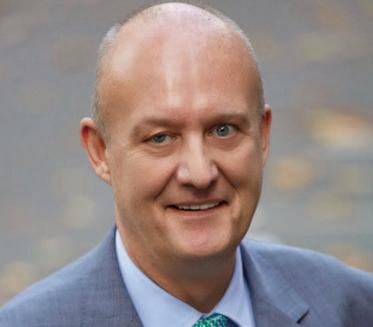
A White Paper commissioned by Care England has suggested that an innovative mattress-turning system has the potential to prevent pressure ulcers occurring for people in adult social care, while improving their comfort and promoting healing – all while delivering significant cost and resource savings to care providers and the NHS.
The paper, called Preventing Pressure Ulcers: The Role of Automatic Lateral Turning Systems for Innovative Approaches to Pressure Ulcer Prevention in Care Homes examines and summarises a 12-week trial of the Levabo Turn All automatic lateral turning system (ALTS), developed in partnership with Algeos Ltd (UK).
The White Paper says that pressure ulcers are one of the most painful and preventable conditions faced by some of the most vulnerable individuals in adult social care.
Care England, the voice of care, is a registered charity, is the leading representative body for small, medium and large providers in England.
The report stated pressure ulcers affect 700,000 people a year in the UK at a cost to the NHS of £1.4 to £2.1 billion a year.
It added that “the realities of staff shortages, increasing demand, and the need for manual repositioning often place an undue burden on both caregivers and residents,” so residents did not always receive the attention they needed to ease the pain caused by their ulcers.
Furthermore, Professor Martin Green OBE, Chief Executive of Care England, said “technological solutions like this would not only ease the workload of the caregiver, but it would also offer a more dignified care solution to the individual as well as an improved quality of life”.
The trial took place in three care homes in the UK and involved 24 residents across 12 weeks, addressing manual repositioning for pressure ulcer prevention using the Levabo Turn All solution which is an automatic tilting system (ALTS) that helps prevent and treat pressure ulcers by positioning a person in a 30-degree side position alternating between the right and left side. The system can be used in any healthcare bed with a removable mattress, where it is placed under the mattress.
The trial focused on residents with dementia with multiple and complex comorbidities, and those receiving palliative end-of-life care who are particularly vulnerable to pressure ulcers due to immobility and frailty.
The primary aims were to assess the effectiveness of the system in reducing pressure ulcer incidence, its impact on caregiver workload, resident comfort, and overall cost-effectiveness.
During the trial, the system was successful for residents with both dementia or dementia with challenging behaviours; existing pressure ulcers/vulnerable at-risk skin; limited or no mobility; pressure ulcer prevention and treatment; end of life/palliative care; critical illness and spinal/neurological conditions.
Key findings from the trial included that using ALTS in a care setting has several key benefits, particularly for residents at risk of developing pressure ulcers and those in end-of-life palliative care.
The system was effective in preventing and managing pressure ulcers by automatically repositioning residents, thus reducing prolonged pressure on vulnerable areas, significantly lowering the risk of further breakdown of skin without unnecessarily disrupting residents, leading to improved sleep and quality of care by automating the manual task of turning residents which can be every 4 to 6 hours, day and night requiring two caregivers’ time and effort to reposition. The system freed up caregivers’ time to focus on other critical tasks and areas of care – often up to two hours a day per person.
The White Paper also found that use of the system delivered cost savings in preventing the occurrence of pressure ulcers and the need to treat them.
In addition, residents using ALTS generally showed fewer signs of discomfort or agitation during repositioning, an important factor for those with dementia. The report stated for residents in palliative care, ALTS provided a gentler, less invasive approach to repositioning, supporting their comfort and dignity during end-of-life care.
One of the homes taking part in the trial, the Taylor and Taylor group, said that each caregiver would save two hours a day through not having to manually turn an individual during a 24-hour period. Given 11 people needing this facility, that would save 22 hours a week which in monetary terms based on an average salary, equates to circa £1,600 a week and roughly the same cost of one system itself.
Professor Green said: “The trials have shown that a system of this type can in many cases provide big benefits in pain reduction and healing for the individual, while easing the burden of care to the caregiver and doing so at a net saving of cost to the care provider or allowing them time to support other aspects of their care plan”.
“The trial has shown that once again, technology can work hand-inhand with excellent care provision to offer dignity, pain reduction, and enhanced healing to those most in need of it.”
Beth Mercer, Commercial Manager at Algeos Ltd (UK) said: “The trials have shown exactly what we hoped – that the Levabo Turn All system not only makes life more bearable and dignified for the individual by reducing their risk of pressure damage, pain and discomfort; it eases the workload and burden of repositioning to staff, freeing up time to focus on other aspects of care, and demonstrated time, cost savings, and efficiencies thus providing benefits to caregiver and care receiver alike.”

Katrina Ball, manager at Oake Meadows care home in Taunton, is flying high after winning the prestigious Social Care Superwoman of the Year Award at the 2024 Women Achieving Greatness in Social Care (WAGS) Awards.
The Social Care Superwoman Award recognises women who have achieved outstanding results in the face of adversity, going above and beyond to promote positive outcomes for staff, residents, and the broader community.
The awards ceremony, held in London, shone a spotlight on Katrina’s inspiring journey and her significant contributions to the social care sector.
Oake Meadows, which is operated by Larchwood care, has had Katrina at the wheel since 2017, who has transformed the care home during a pivotal period of change.

Taking the reins during a challenging transition, she provided much-needed stability, instilling strong leadership and a clear sense of direction. Her efforts resulted in Oake Meadows
achieving consecutive ‘Good’ ratings from the Care Quality Commission (CQC)—a first for the home in over a decade.
Though she trained as a nurse 21 years ago, Katrina’s passion for care has been a lifelong journey.
Katrina said: “I’ve worked in care homes since I was 15 years old, and it’s always felt like a natural path for me.
“Receiving this award is an incredible honour, and it reflects not just my journey but the dedication of the amazing team at Oake Meadows. I’m so fortunate to work alongside such passionate, caring individuals who share my commitment to making a real difference in the lives of our residents. This award is as much theirs as it is mine.”
Alison Boote, operations director at Healthcare Management Solutions: “Katrina’s ability to boost staff morale, and create a supportive, compassionate culture
Ten Parklands Care Homes employees from various locations and roles have completed a two-day Mental Health First Aid training course. The programme is designed to equip participants with the skills to recognise, understand and respond to mental health challenges, including identifying individuals at risk of suicide. Delivered by Moray Wellbeing Hub, the training also sought to break down stigma surrounding mental health in the workplace and gave participants awareness of where to signpost colleagues, family and friends for help. One employee described it as “the most supportive and friendly course I have ever been on.” Staff from homes in Muir of Ord, Grantown, Aberlour, Keith,

Buckie, Cullen and Huntly took part in the training.
Organisers praised the "warmth and candour" of those involved, describing them as "a credit to Parklands."
HR Advisor Lynda Mackenzie said: "Supporting our Mental Health First Aider training has been incredibly rewarding. It has not only empowered our staff with vital skills to recognise and respond to mental health challenges but also fostered a culture of openness and support, ensuring a stronger and more compassionate workplace for everyone."
It's hoped that further training will be rolled out next year.

has truly set her apart and ensured the best care for the residents at Oake Meadows.
“We’re all very proud of Katrina, who under her leadership, has transformed the home and is leading by example to the staff and other managers across the country, who are working above and beyond to ensure residents receive the best possible care.”

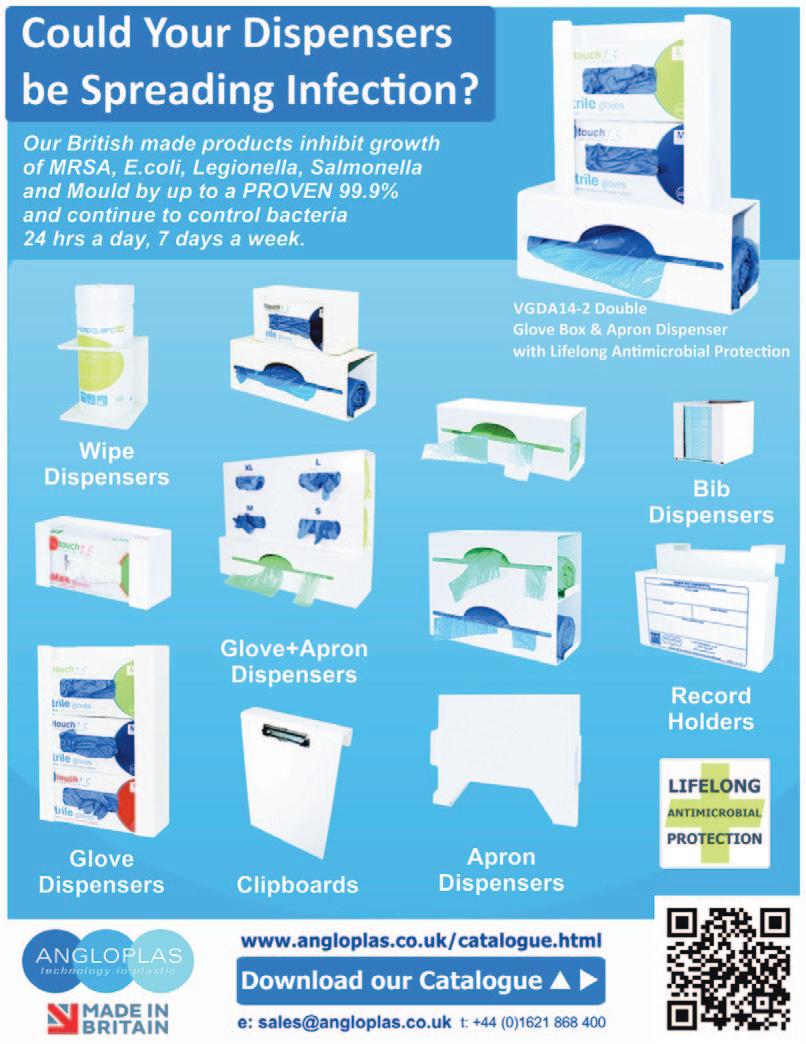
Charity Carers UK is reflecting on 60 years of change in campaigning with and for unpaid carers across the UK looking after an older, disabled or chronically ill friend or family member.
The charity’s history stretches back to 1965, when Reverend Mary Webster founded the first ever national unpaid carers organisation to raise the plight of women who were ignored and invisible, whilst caring for their older relatives.
Today, Carers UK campaigns with thousands of carers who have lent their voices to help to lead and shape the charity’s direction to make life better for the 5.8 million unpaid carers in the UK.
Over the last 60 years, campaigns by Carers UK have seen crucial new rights introduced; from the first ever benefit to support unpaid carers, Invalid Care Allowance in 1976 (later renamed Carer’s Allowance), to the Carer’s Leave Act in 2024. Our focus now is on the needs of unpaid carers today – and what we need to do to create greater equality, support and further recognition in the future.
Research has shown that despite these hard-won rights, support still falls far short of what carers need to have an equal place in society. 600 people a day have to give up work to care. Carers are much more likely to be in poor health as a result of caring, and many experience loneliness and isolation. 1.2 million unpaid carers are currently living in poverty.
This is why for Carers UK’s 60th anniversary, the theme is ‘Equality: today and

tomorrow’. Although there have been advances for carers during this time, there is still much to do to ensure unpaid carers have equality in all walks of their life.
Helen Walker, Chief Executive of Carers UK, said: “For the past 60 years Carers UK has fought for a better deal for carers, the charity’s mark can be seen in every major piece of legislation for carers – an incredible legacy to look back on, but whilst we have seen visible progress, stark inequalities persist.”
“60% of carers report a long-term health condition or disability compared to 50% of non-carers, and the rate of poverty amongst unpaid carers is 50% higher in comparison to those who do not provide unpaid care.”
“Unpaid carers in the UK provide care worth a staggering £184 billion a year, yet still too often do not receive the recognition or support they need. The reality for many is extremely tough.”
“That’s why we’re encouraging everyone in 2025 to join us in taking action to help make life better for carers. With our focus on equality, we also want to see caring made a protected characteristic, which could help to improve awareness of carers’ inequalities and address invisibility.”
“We are using our 60th anniversary year to put unpaid carers in the spotlight, to continue our drive to campaign for lasting change, focusing on what we need to do to create greater equality, support and recognition for carers in the future.
A Lytham St Annes home welcomed the pantomime season by getting their staff to perform their very own panto.
Staff from MHA Starr Hills decided to entertain its residents by arranging their own pantomime with staff taking to the stage.
The MHA Starr Hills Panto has become a tradition at the home and it's the perfect way to celebrate the festive season.
There was plenty of singing, dancing and fun, which was enjoyed by all.
The home offers residential care and support for up to 36 people.
Emma Falkingham, activities coordinator said: “The MHA Starr Hills Panto was so much fun, and the residents absolutely loved it!
They sang along with us, the room was filled with laughter and festive cheers!
“It was a great evening, everyone had a lot of fun and enjoyed themselves
“The feedback has been so positive, smiles galore and very happy residents!
“Afterwards we served warmed mulled wine and drinks from the bar with chocolates.
“All the staff were fantastic and put in lots of effort to make the show fun and merry for the residents.”

Alzheimer’s Research partner, The Perfume Shop, has reached a partnership milestone – raising over £1.6 million for dementia research. The incredible achievement was celebrated at their annual conference in Cardiff.
Charity Ambassador and husband of the late Dame Barbara Windsor, Scott Mitchell, attended the event to speak about his personal experience and the importance of their support.
Since 2014, their staff, known as TPS People, from across UK stores have dedicated themselves to raising funds for dementia research, year after year. Activities included in-store collections, personalised ribbon sales, running challenges, fashion shows, skydives, bungee-jumps and treks up Kilimanjaro!

Their efforts have funded life-changing dementia research, as well as supporting our Infoline for one year, a service that shares vital dementia information to the public.
Hilary Evans-Newton, Chief Executive of Alzheimer’s Research UK, highlighted the joys and impact of the partnership, emphasising its role in accelerating progress towards a cure.
“We are delighted to be celebrating ten incredible years in partnership with The Perfume Shop,” said Evans-Newton. “TPS People have gone above and beyond to demonstrate their extraordinary commitment to support our work to end the heartbreak of dementia.”
Gill Smith, Managing Director at The Perfume Shop, expressed pride in her colleagues’ efforts, commenting: “I am incredibly proud of our longstanding partnership. Our TPS People have shown unwavering commitment to raise funds and awareness. Together, we have funded ten vital research projects and supported the charity’s Infoline, making a meaningful impact.” said Smith. “I look forward to continuing our partnership and making even greater strides in the years to come.”
Birchmere Mews Care Home has successfully raised nearly £1,200 for the Mad Hatters Children’s Charity with a fun-filled, 24-hour Bike-a-thon. The event, held in the spirit of the charity’s whimsical namesake, brought together residents, staff, and families in a community-driven effort to raise vital funds for children with special educational needs and disabilities.
Participants at the care home kept the pedals spinning day and night, with everyone rallying together in the “mad hat” spirit, creating a vibrant, festive atmosphere.
In addition to the cycling challenge, Birchmere Mews Care Home organised a raffle with generous donations from local businesses, including standout prizes like gift vouchers from Cheals in Knowle, adding a touch of “wonderland” magic to the event. Mad Hatters Children’s Charity, based in Solihull, is dedicated to

enriching the lives of children with
“I’m
Mews
Erica Lockhart, Chair of the South East Social Care Alliance (SESCA), has been awarded an MBE in the King’s New Year Honours List 2025 for her outstanding contributions to the social care sector.
Reflecting on the recognition, Erica said: “I am extremely honoured to receive this award. It has been a privilege to have operated in so many different fields within social care during my 50 years in the sector as well as interacting with countless dedicated individuals committed to making a difference to people’s lives. As Chair of South East Social Care Alliance I would like to pay tribute to the local Care Associations who work so hard to support their social care providers and their teams who devote themselves to care and support for people in our communities.”
SESCA congratulated Erica, stating: “This is a very well-deserved recognition for many years of dedication, support, and inspiration for the sector.”
Erica has inspired countless individuals over her career in social care, leaving a permanent mark on the Care Sector and beyond. She transitioned from qualified Social Worker to several years in senior management in Surrey County Council to CEO of
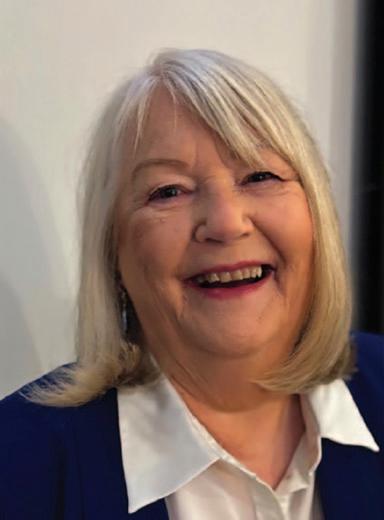
Surrey Care Association (SCA), retiring in 2021.
Under her leadership, SCA prospered into a thriving organisation over her 16 year tenure, notably establishing the Surrey Care Awards, recognising care workers’ achievements which has now been replicated by many other associations. As well as negotiating with local authorities in Surrey and Sussex to establish a major workforce and business development conference, which became a key event in the Social Care calendar.
Erica recognised the necessity for national representation for Care Associations which led to her co-founding the Care Association Alliance (CAA) in 2010. The CAA became a vital platform uniting Care Associations nationwide and amplifying providers’ voices in pivotal dialogues with government, regulators, and workforce bodies driving positive, national change.
Erica then went on to establish SESCA in 2020, uniting nine Care Associations to ensure a strong regional voice for Social Care, leading projects to enhance workforce capacity and developing a model for regional coordination and innovation.
This winter, Recreo VR is offering care homes an exciting opportunity to enhance resident wellbeing through the power of Virtual Reality (VR). By signing up for one of our 24-month Recreo Theatres packages, you’ll receive a free VR headset and staff training.
Our platform provides person-centred, budget-friendly activities that are fun, engaging, and accessible, especially for residents who are bedbound or socially isolated. Co-created with Alzheimer’s Society and individuals with dementia, our service empowers staff to deliver personalised reminiscence and one-to-one sessions that promote memory recall and connection.
Our VR headsets have been recognised as good practice by the Care Quality
Commission (CQC), further validating their impact on care. Regular use of Recreo VR has a proven positive effect on wellbeing, with residents reporting increased activity, engagement, and social connection, often leading to a reduction in the need for PRN medication.
Whether combating loneliness, promoting relaxation, or enhancing cognitive health, VR offers a non-pharmacological solution to enrich care and elevate quality of life. Don’t miss out! Take advantage of this exclusive offer and see how VR can transform your care home experience.
For more information, visit recreovr.co.uk. Or contact us at info@recreovr.co.uk or 01482 526940.
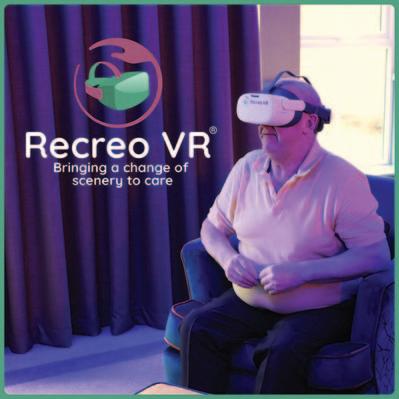
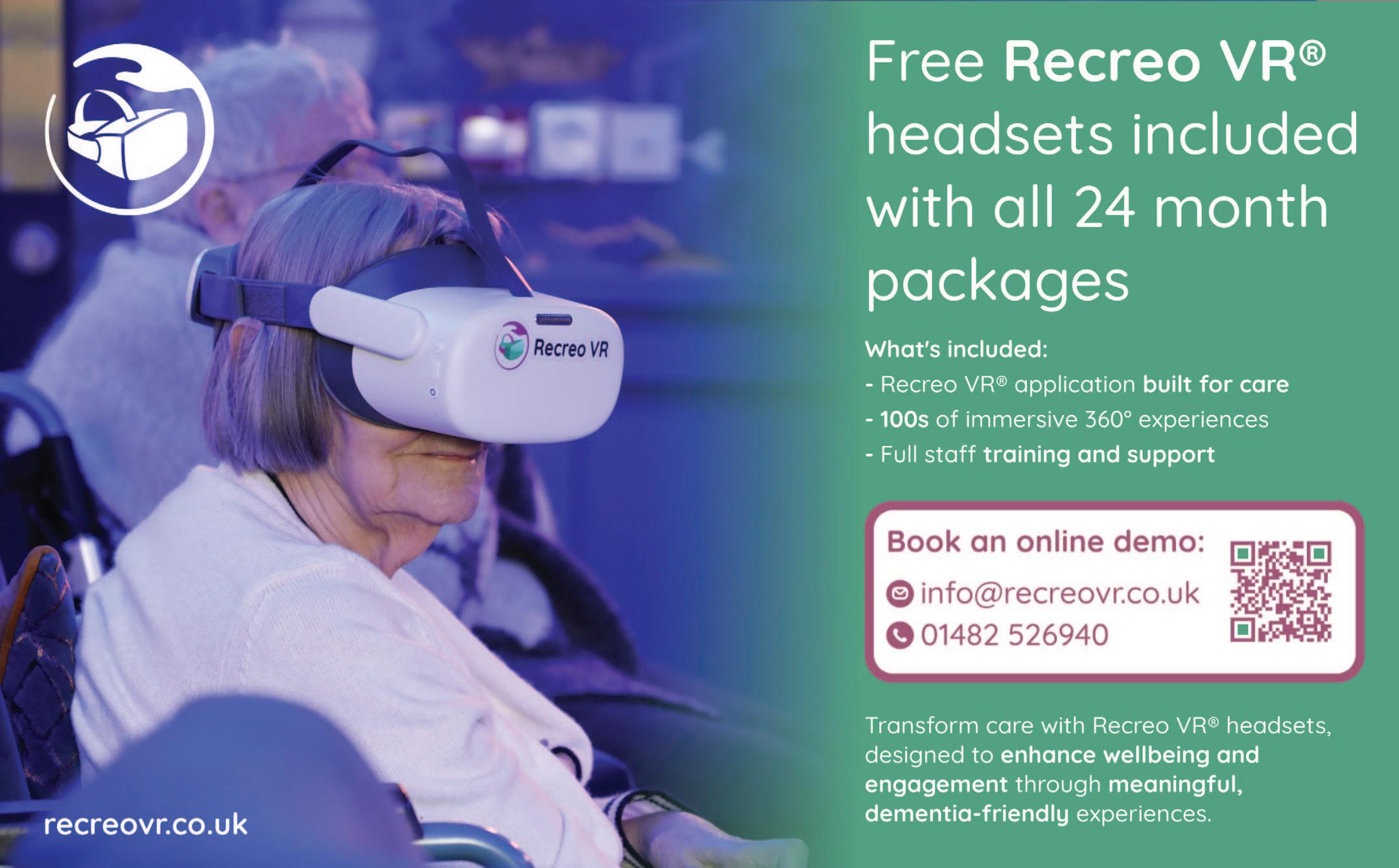
Saint Cecilia’s Care Group is to further expand its services by offering specialist care for the local community.
The award-winning care provider is launching Asters, a service to support people over 16 who live with a learning disability and/or autism.
The new addition will broaden the services offered by Saint Cecilia’s alongside its care for older people and The Lounge community hub.
Asters Specialist Care Executive Chairman, Mike Padgham said: “We are always looking to offer services that fit a vital need in the communities that we serve, and specialist learning disability support is an area where we feel we can make a meaningful impact through co-production, collaborating closely with individuals, families, and professionals to ensure that our services are bespoke to everyone’s unique needs and preferences.”

“It is a unique and highly varied type of care, and we are leveraging our 35 years of experience in delivering quality care while also bringing in new expertise to enhance service delivery. Our focus is on building the right support to ensure that individuals receive person centered, co-produced support plans putting them at the heart of decision making and care planning to enhance their quality of life.
“We look forward to working with some amazing and very special members of our community and their families and to providing them with a level of care that will help give them freedom and independence to live, happy fulfilled lives.”
The service will be led by Lynne Taylor, an established and award-winning Registered Learning Disability Nurse with more than 25 years’ experience of NHS, nursing, social care and care management and who brings to Saint Cecilia’s her specialist knowledge and expertise.
The service’s name, Asters, derives from the popular plant and it has been chosen because the flower comes in many different varieties, can flourish in adversity and blooms and blossoms when cared for and nurtured well.
The latest addition will mean that Saint Cecilia’s has The Lounge for people who want to come out and enjoy activities and some companionship; respite care for caregivers who need a break, learning disability care, Autism support, care homes for those needing around the clock care and dementia care and nursing care for those with more complex needs.
Two of Scotland’s most recognisable football figures have been appointed as ambassadors for one of Scotland’s leading disability charities.
Former football star and SFA Chief Executive, Gordon Smith, and ex-Rangers and Motherwell midfielder and Derby County manager, Billy Davies, will use their influence to champion Capability Scotland’s work across Scotland.
Both ambassadors will play a key role in vital fundraising campaigns, aimed at raising funds to provide life-changing support for disabled people and their families.
Speaking about his appointment, Gordon Smith said: “Capability Scotland is a charity I have admired for a long time, and I’m honoured to step into this ambassadorial role.
“This role gives me the chance to make a real difference – whether that’s through opening doors to football networks, attending fundraising events like golf days, or sharing Capability Scotland’s message far and wide.” Gordon’s track record of advocacy includes his position as Chairman of the Variety Club, where he has worked to improve the lives of disabled and disadvantaged children.

Joining Gordon Smith is Billy Davies, a talented midfielder in his playing days for clubs such as Rangers and Motherwell and managed clubs including Motherwell, Nottingham Forest and Derby County he is widely regarded as one of Scotland’s top football managerial talents.
Billy Davies described his enthusiasm for the role: “From the first moment I connected with Capability Scotland, I wanted to get involved however I could.

“This is a charity doing incredible work, and I’m proud to be part of it. I’ll be helping to promote campaigns, sharing its message through my networks, and supporting fundraising efforts wherever I can.”
Both ambassadors will support Capability Scotland’s work for the foreseeable future, with a particular focus on fundraising activities.
Their involvement will include attending key events, acting as speakers, and leveraging their connections to help raise awareness for the charity.
Sean Donachie, Deputy Director of Adult Services at Capability Scotland welcomed the football legends on board: “We’re extremely excited to have Gordon and Billy join us as ambassadors.
“Their passion for giving back and willingness to get involved will be invaluable to our work.
“Capability Scotland has ambitious plans to support more disabled people and their families across the country. With Gordon and Billy by our side, we’ll be able to reach new audiences, secure vital funding, and continue making an impact where it’s needed most.”
Gordon Smith, celebrated for his footballing career at Rangers, Brighton & Hove Albion, and Manchester City, also brings vast experience as an agent and executive within the sport. He has been instrumental in improving pathways for young footballers through the Home Nations Agreement.
Billy Davies, meanwhile, is recognised for leading Derby County to promotion via the 2007 Play-Offs and taking Nottingham Forest to the brink of the Premier League on multiple occasions.


• We specialise in the sale and purchase of quality used wheelchair accessible vehicles and ambulances.
• They can be bought as seen or refurbished and sign-written to your own requirements.
• Fully serviced, new mot & warranty
• Engineers inspection supplied if required.
• Free delivery
• All buses comply
•



Throughout January and February Skills for Care is running a campaign to encourage social care workers to #KeepLearning.
The campaign follows on from the success of the same campaign ran at the same time last year, which received positive feedback from across the sector.
The ‘Learning and development matters’ campaign aims to promote the benefits of learning and development for staff at all levels and raise awareness of opportunities available for ongoing learning.
Learning and development are at the heart of any social care organisation’s success, as investing in these areas is key to retaining a capable workforce. Retaining staff is something that our sector needs to do better if we’re to keep up with the increasing demand for care services.

Our data shows care workers who receive more training opportunities have lower turnover. These organisations also tended to perform better during Care Quality Commission (CQC) inspections.
We also want to use this campaign to focus on some of the recent changes to the sector’s learning and development landscape, such as the new Level 2 Adult Social Care Certificate Qualification, the ongoing development of the Care Workforce Pathway and how to access funding in 2025 through the Learning and Development Support Scheme.
The campaign will offer a wealth of information, articles, and resources designed for everyone working in social care, from care workers to registered managers, nurses, social workers, individual employers, personal assistants, and more.
Specialist independent health and social care provider, Iris Care Group, has announced that Dr Andy Jones has been appointed as the organisation’s Chief Executive Officer.
Iris Care Group is the largest specialist complex care group in Wales and the South West of England, including hospitals, residential homes, supported living, and Special Education Needs services.
The group was formed in May 2023, following the merger of two established care providers, Ludlow Street Healthcare and Holmleigh Care Homes. It currently employs over 1,700 staff who are managed out of its regional offices in both Cardiff and Gloucester.
The merger was overseen by Chair and interim CEO, Peter Kinsey, a very wellrespected senior executive within the healthcare industry with 35-years’ experience of managing large healthcare services in the NHS, voluntary and independent sec-

tors.
Dr Andy Jones has been appointed to the CEO role where he will be responsible for the day-to-day running of the organisation and delivering the group’s growth plans. The appointment enables Peter Kinsey to focus on his role as Chair.
Dr Jones commented: “Iris Care Group has earned a reputation for the quality of treatment and care it provides for individuals with complex mental health conditions, and putting the needs of the people they support at the heart of everything they do.
“My primary goal as CEO will be to grow and develop more essential services in this under-resourced sector, whilst maintaining our quality-of-care ethos and continuing to ensure staff feel valued and respected.”
Peter Kinsey, Chair of Iris Care Group, adds: “With the merger now successfully completed, Andy’s track record of delivering enhancements at the helm of leading healthcare businesses made him the perfect choice to drive Iris Care Group’s future
On 7th November, whilst the tectonic political plates were shifting, here and in the USA, another event of national significance was happening – launch of the UK’s first national urgent acute medical service, by pioneering digital health company Virtue. We’re pleased to provide a sneak preview of their launch, which will be covered by national press in January, explaining what this means for your patients, together with your businesses, both of which stand to benefit by this transformational service that brings together acute and social care in a novel way.
For the first time in the history, the people of Great Britain can access urgent acute medical treatment, nationally, by an organisation other than the NHS. Not only this, but care can be received instantly, in the comfort and convenience of home, simply by calling Virtue. This offers patients an alternative to attending NHS A&E or suffering the impact of a hospital admission.

This appears a momentous step change in the evolution of our national healthcare infrastructure, which could be a vital component in ensuring members of the public, can access acute care quickly, in spite of the rising pressures on the NHS system.
For just £14.99 per month, anyone over the age of 18 can become a Virtue Member. Virtue Members receive a Welcome Pack which includes a range of smart medical devices that enable Virtue’s remote team of nurses and consultant specialists, to respond to an urgent medical need immediately. Their clinical team then monitor the patient, prescribe medication and even provide online physiotherapy to support holistic and faster recovery. Where needed, Virtue also provide IV antibiotics in the home. Virtue call it ‘Acute Hospital-at-Home’, also coined ‘virtual ward’.
Before you think it’s too good to be true, Virtue do also charge a fee of £125 per night for treatment, which given the average ‘length of stay’ of 7 nights, can add up to £875. So overall, it’s not cheap. So, is it worth it?
We asked Dr Andrew Barlow, Chief Medical Officer of Virtue, his view and justification for the cost. Dr Barlow, who is recognised by NHS England as founder of the first NHS Covid virtual ward explains, “a hospital admission is a catastrophic life event, especially for someone over the age of 70. Patients are suffering from a serious, often life-threatening medical situation, which is made more traumatic by separation from their family, familiar environment and care team. Patients are at risk of acquiring infections, which during the pandemic caused one third of covid cases. Perhaps worse of all, is the ‘hospital-acquired degeneration’, which research shows to leave patients with an average 50% loss of functional ability. Patients leave hospital a shadow of their former self, and at that age, they just don’t recover. This often means patients are discharged into a care home, meaning they leave their domiciliary care provider and are forced to sell their family home”.
So is it worth it? We think so. In fact, we think this is revolutionary.
Not only is this a game changer for the patient, but Virtue CEO and Founder Robert Orford believes it will play a key role in fixing the fundamental historic divide between the acute and social care sectors. Robert explains, “we offer a partnership programme to domiciliary care and nursing homes providers, meaning they benefit financially from the delivery of our treatment, at a rate of £40 per hour. This enables our partners to pay their staff more, recruit and retain talent and fundamentally change the profitability of their business”. Interested social care providers can apply to be a partner at www.virtuehealth.co.uk

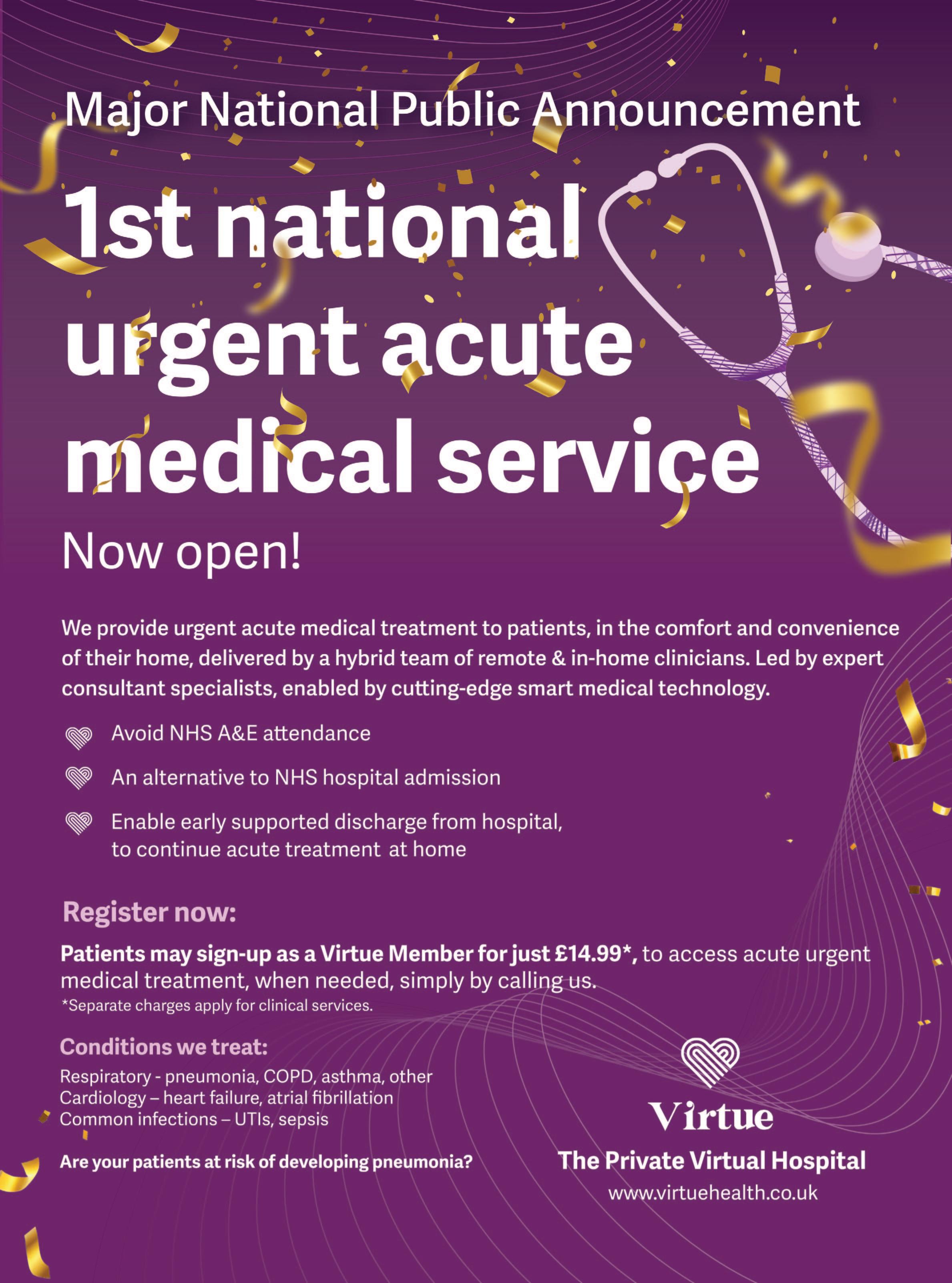
Throughout January and February Skills for Care is running a campaign to encourage social care workers to #KeepLearning. The campaign follows on from the success of the same campaign ran at the same time last year, which received positive feedback from across the sector.
The ‘Learning and development matters’ campaign aims to promote the benefits of learning and development for staff at all levels and raise awareness of opportunities available for ongoing learning. Learning and development are at the heart of any social care organisation’s success, as investing in these areas is key to retaining a capable workforce. Retaining staff is something that our sector needs to do better if we’re to keep up with the increasing demand for care services.
Our data shows care workers who receive more training opportu-

nities have lower turnover. These organisations also tended to perform better during Care Quality Commission (CQC) inspections.
We also want to use this campaign to focus on some of the recent changes to the sector’s learning and development landscape, such as the new Level 2 Adult Social Care Certificate Qualification, the ongoing development of the Care Workforce Pathway and how to access funding in 2025 through the Learning and Development Support Scheme.
The campaign will offer a wealth of information, articles, and resources designed for everyone working in social care, from care workers to registered managers, nurses, social workers, individual employers, personal assistants, and more.
for blending history with contemporary creativity in his artwork.
Christopher, now a resident at Droitwich Mews Care Home in Droitwich Spa, is a talented artist, and in his early twenties was offered a place at the Royal College of Art in London, however his father felt studying glassmaking at the Stourbridge School of Art in the West Midlands would be a better fit with his future career in the family business.
After retiring, Christopher dedicated more time to his love of painting in various media mainly watercolour and acrylic. He initially focused on painting boats and reflections on water.
More recently, as his Parkinson’s disease has progressed, his style has adapted to become more focused on nature. The paintings are often based on photos taken by his daughter, Lucy, who is a talented photographer.
Christopher’s artwork has been displayed in the care home since August 2024 and continues to be a source of inspiration.
Christopher said, “I really enjoy still being able to paint whilst living in

His artwork, including paintings, greeting cards, and gifts, brings colour and history to the care home, captivating both residents and visitors alike.
Christopher participates in weekly art sessions, organised by the Droitwich Arts Network (DAN) and led by local artist Derek. This initiative has built a creative community within the care home, encouraging selfexpression and connection among residents.
Christopher’s passion for Art Nouveau glass, especially Stuart Crystal designs, is evident in his modern interpretations, which have been wellreceived by the Droitwich Spa community.
Hannah Atkinson, Home Manager of Droitwich Mews Care Home, part of Avery Healthcare, commented, “Christopher’s artwork is a reflection of his life’s journey and passion, captivating everyone here at Droitwich Mews with its profound beauty and inspiring depth.”
The residents have also expressed their admiration for Christopher’s creations. One resident shared, “It’s such a joy to see Christopher’s art displayed throughout the home. Many of his pieces spark wonderful conversations and bring vibrancy to our days.”













Lighting plays a vital role in every aspect of our daily lives. As nursing and care homes continue to navigate rising energy costs, lighting has emerged as a critical area for improving energy efficiency with the potential to reduce lighting costs by as much as 85 to 90%1 by using efficient solutions. The type of light bulb used can impact the time and cost spent on maintenance which is particularly important in care settings where costs saving measures are prevalent2
By adopting smarter lighting solutions, nursing and care homes can reduce energy consumption while enhancing the overall environment for occupants. In this article, Dyson shares how the sector can adopt smarter lighting solutions that not only help to cut costs but also support inhabitants’ wellbeing.
Many nursing and care homes across the country are now equipped with motion activated lighting, reducing costs, improving energy efficiency and avoiding unnecessary usage. By investing in lighting that is also controllable by an app, care managers have the flexibility to turn off lights remotely at the touch of a button adding an additional level of peace of mind.

Changing light bulbs regularly takes time, investment and organisation. Fluorescent lighting can be inefficient, waste light and use costly-to-replace bulbs. Without proper cooling, LED bulbs can quickly overheat, causing fading, discolouring and them to work efficiently. Lights such as the Dyson Solarcycle task light that use Heat Pipe technology can effectively cool the LED and protect the light quality for 60 years3. In turn, this allows the user to reliably adjust its colour and brightness without flickering bulbs and outages.
Recognising the importance of fostering a happy, healthy, and supportive care environment, care home settings are placing increased emphasis on these aspects. While lighting may seem inconspicuous, it profoundly impacts the wellness of residents and caregivers alike.
In many nursing and care homes, lighting can feel clinical with a ‘one size fits all’ approach to lighting which creates strain on the eyes. Acknowledging that individuals have diverse needs and perceptions regarding wellness and mental health, these spaces must remain adaptable to meet these varied requirements effectively. By creating bespoke lighting options in individual rooms, a user can adjust the lighting to suit their specific needs.
Low quality light can cause negative side effects such as migraines, headaches and eyestrain. By giving occupants the option to adapt something as simple as lighting to suit their needs will have positive effects on their wellbeing and comfort.

In addition, we spend about 90% of our time indoors4, exposing ourselves to artificial lighting more often than not, with many neglecting to think about how this can affect their sleep cycle. Light is a primary external factor influencing sleep patterns. While the notion that darkness aids sleep is commonly understood, the relationship between light and sleep is far more intricate.
Light plays a pivotal role in regulating the body's circadian rhythm, the internal clock dictating periods of wakefulness and rest. Moreover, it impacts the production of melatonin, a hormone crucial for promoting sleep. The daily exposure to light, including its quality, timing, and duration, significantly impacts sleep quality. Understanding the intricate connections between light and sleep empowers individuals to optimise their residing environment for consistent and restorative sleep.
In conclusion, strategic lighting design and innovation go beyond energy savings. By adopting human-centric lighting solutions, nursing and care homes can create environments that not only enhance their residents’ wellbeing and prioritise their health but also support the productivity and comfort of their caregivers. Lighting, when done right, can be a powerful tool in fostering a happier, and healthier nursing and care home.


1 https://www.lbhf.gov.uk/business/business-connects/support-and-advice-businesses/costdoing-business/guide-energy-efficiency-and-cost-savings-your-workplace
2 https://www.gov.uk/government/news/more-funding-to-schools-hospitals-and-publicbuildings-to-lower-energy-use-and-save-on-bills-and-cut-carbon-emissions
3 LED-life
4 https://ec.europa.eu/commission/presscorner/detail/en/IP_03_1278
To learn more on how to create a nursing and care home that enhances residents’ and workers’ well-being with bespoke lighting solutions, visit Dyson technology’s business hub and book a call:
Since our founding in 2010, Activities to Share has been dedicated to enhancing the lives of those in care by providing thoughtfully designed activity products. Our mission is to support activity coordinators in delivering uplifting, engaging experiences that foster connection, joy, and well-being.
We achieve this by listening closely to your feedback and evolving with your needs. Whether over the phone, via email, WhatsApp, or Live Chat on our website, our team is always ready to offer advice and help you find just the right products to bring your ideas to life.
While we embrace the convenience of technology to expand our resources and share knowledge, we remain firm believers in the irreplaceable power of sensory


MOWOOT II – proven solution to chronic constipation without medication
Developed by a team of doctors and other healthcare professionals, MOWOOT II performs gentle abdominal massage to speed up intestinal passage in people experiencing chronic constipation.
Clinically proven, safe and effective, relaxing and sideeffects free, MOWOOT II

Abdominal Massage Therapy System combats constipation and provides soothing relief to affected people.
Easy to use and comfortable, the MOWOOT II treats and manages constipation in people with spinal cord injuries, multiple sclerosis sufferers, Parkinson’s Disease patients and people with constipation related to prescription medication. MOWOOT II also helps to relieve idiopathic constipation experienced by menopausal and post-menopausal women
and older and elderly people.
In clinical studies
MOWOOT II increased evacuation frequency, softened stools, improved regularity, reduced gasses, relieved bloating and eased off abdominal discomfort.
10 to 20 minutes daily of relaxing abdominal massage with MOWOOT II rapidly reduces symptoms of constipation. Evident results are experienced only a few days after the first treatment. Regular abdominal massage with MOOWOOT II ensures lasting health benefits and better quality of life.
MOWOOT II – effective solution to chronic constipation for better quality of life!
Supplied by Win Health Medical Ltd - 01835 864866 - www.win-health.com
See page 3 of this issue for other Win Health products.
Consort Claudgen’s innovation in the electric heating industry takes another leap forward by introducing Wi-Fi-enabled heaters to their low surface temperature (LST) range. These cutting-edge heaters offer unparalleled convenience and efficiency. The heaters connect directly to Wi-Fi, enabling users to control heating through the digital control panel on the heater or via the Consort Connect app. With a comprehensive 7-day timer, which allows 24 individual heating periods per day, and features such as a lock function, open window detection, and custom automation, users can tailor their heating needs to their preferences. Adding to the ease of use, users can view the

energy consumption statistics of all connected heaters, providing insights into usage patterns and potential savings. The LST heaters with Wi-Fi and occupancy sensors have a self-learning control ability. They utilise inbuilt occupancy sensors to detect and learn a user’s weekly presence in a room, creating an intuitive heating schedule. When the space is unoccupied, the heater conserves energy by switching to a setback temperature or frost protection mode.
BIM (Building Information Modelling) objects for the heaters are available for download from Consort’s website. 01646 692172 | sales@consortepl.com | www.consortepl.com
See the advert on page 9.
engagement. That’s why we continue to make our Reminiscence Kits and Sensory Bags with real, tactile items that stimulate the senses. Some experiences—like popping bubbles for the splash, breathing in a familiar scent, or piecing together a puzzle with others—simply can’t be replicated on a screen. These sensory moments are invaluable in encouraging storytelling, sparking memories, and fostering conversation.
Our values remain rooted in this commitment to meaningful connection. We’re here to partner with you—the professionals on the front lines of care—to create a sense of structure, well-being, and fun for those who need it most.
Are you longing for your activity diary to be full? Look no further www.activitiestoshare.co.uk are here for you! See the advert on page 5 or: customers@activitiestoshare.co.uk
0117 966 6761
07900 6751 50
C&S Seating Ltd have provided postural control equipment to residential homes, hospices, medical equipment services and NHS trust hospitals nationwide since 1991. With 9 different sizes of TRolls and Log Rolls, in a removable and machine washable Waterproof Titex or Soft Knit material. These rolls are used to control posture and position of the body in either supine or side lying. Our Knee & Leg support wedges are available in 2 sizes.
abducted lower limb is required.
Our popular and vibrant range of Soft Knit covers in a choice of 5 colours, provide a softer alternative, ideal for the colder seasons and are designed to fit snug over our waterproof rolls for maximum protection and comfort.

C&S Seating Ltd is the sole manufacturer of the Alternative Positioning Support – also available in two sizes, which has removable side cushions and middle pommel for when more control of the
Contact us on 01424 853331 or visit www.cands-seating.co.uk
Since our incorporation in 1997, Alpha Furniture have always striven to provide the best levels of customer service. At the heart of what we do is listening to our clients’ requirements, and helping to propose the best furniture providing practicality and durability for their unique situation.
• Our chairs aren’t just your typical “care” chairs. Working with multiple manufacturers and designers, we have collated a varied range of styles that move away from the archetypal hospital chair while still maintaining the benefits and practicality of high backs, wings, and easy-clean upholstery.
• Everything we sell comes to you from UK manufacturers, supporting the economy and jobs.
• All of our products come with a minimum 5 year guarantee, so you can have the peace of mind knowing your furniture is built to last.
• Our storage furniture in particular, for bedrooms, lounges and dining rooms, is all delivered fully assembled, and finished with solid backs and drawer bases to prevent bowing or leaning, and so much better suited to a healthcare environment than many high street equivalents.
• We have options for all budgets, with a wide variety of care home suited vinyls and waterproof fabrics across numerous fabric bands.
• We have options for all timescales, with dining sets, lounge chairs and bedroom furniture sets available within 10 working days.
• Our vast range isn’t the end of what we’re able to offer, so if you are looking for something specific

our helpful sales team will help to track down the perfect product.
• Our friendly after-sales team will keep you updated with your delivery, and always look to deliver as soon as possible, often able to bring delivery forward even for made-to-order items.
• Full furniture installation and removal of packaging is an available service* allowing you to concentrate on the busy day-to-day of running a home on the day of delivery.
• As the majority of our furniture is made to order in the UK, almost everything can be adapted, whether you require a wider chair, a narrower dressing table, or simply combining materials on a chair to enhance the design – all for very little additional cost if at all.
For further information, see the advert on page 13 or visit www.carehomefurnituredirect.co.uk
*Additional charges may apply.
Planning and preparation by catering teams in the build-up to Christmas are crucial to ensure smooth operations and a successful festive period. Tess Warnes, Dietician at independent food procurement specialist allmanhall (allmanhall.co.uk), offers her tips on preparing for one of the busiest times of the year.
START EARLY: ORDERS AND DELIVERIES
From the start of November, the demand for festive products surges, leading to limited stock availability across the market. It is important to forecast and place orders as early as possible, enabling suppliers to allocate stock more effectively, thereby reducing the risk of short deliveries and out of stocks.
By placing orders early, catering teams can also take advantage of supplier promotions and manage budgets more efficiently, but still allow for small adjustments closer to the delivery date when more exact operational requirements are known.
While placing forward orders helps suppliers allocate products, it does not guarantee stock. The closer the delivery is to Christmas, the higher the likelihood of shortages. Where there is feasible storage, place orders for non-perishable and long-shelf-life items several months in advance to secure the stock. This also allows more time for contingency plans should there be any stock issues on any products. For fresh produce, work with suppliers or through your procurement partner to schedule advance orders with delivery dates.
Double-check order details, quantities, and delivery dates to avoid
last-minute surprises.
SUPPLIER ENGAGEMENT AND COMMUNICATION
During the busy festive season, maintaining communication within the supply chain is crucial. Regularly engage with suppliers to stay informed about market conditions, commodity challenges, and product availability.
Shortages can arise from limited availability further down the supply chain, such as failed deliveries. Suppliers will attempt to recover stock and, where feasible, source alternative supply chain routes, but it's essential to understand these challenges early so contingency plans can be made.
Currently there are challenges within the potato and cocoa markets, impacting products which are normally high on the requirements for festive menus, so securing stock as early as possible is vital. Once the availability of these products becomes limited, finding any routes to market will be challenging, with associated cost implications.
With surges in demand and limited supply, prices can be volatile during the festive period. Without any prior negotiation or supplier management, costs for products can quickly escalate often resulting in a budgetary overspend and overuse of resources reviewing the market for the most cost-effective options.
By regularly conducting market analysis and monitoring key commodities, catering teams can identify trends and anticipate challenges.
This enables early negotiation with suppliers, ensuring fixed, favourable pricing for the festive period.
The effective use of technology significantly enhances efficiency and accuracy. While these benefits are evident year-round, they become even more crucial during the busy festive period, further aiding operations.
Implementing a catering controls platform can be particularly beneficial, aiding in budget management through recipe building, costings, invoice management, and stock reporting.
Inventory management can be particularly challenging during the festive season, but by using a catering controls platform, catering teams can significantly simplify stock management and have more accurate reports, optimising stock levels.
Catering control platforms provide a comprehensive audit trail from orders to invoices, ensuring complete accuracy in ordering processes. This feature allows catering leads to verify all placed orders, minimising errors and ensuring smooth operations during the frenetic festive season.
“Proper planning and preparation from a procurement perspective are essential for catering establishments to navigate the season successfully”, comments Warnes. “ By starting early, managing supplier relationships, monitoring market conditions, managing inventory, and incorporating technology, catering teams can ensure a smooth, costeffective, and successful festive period.”
Albany Products are working closely with Flavour Creations to bring their market leading and award-winning dysphagia products to the UK market.
This has started with Screamies no-melt Ice-Scream, Shape It food moulds and Powder and initial trials of their extensive pre-thickened drinks range that are available in their award-winning dysphagia cup.
Screamies won the best texture modified food award at IDDSI in 2023. They are supplied ambient and can be frozen prior to eating. Screamies have a specialised no-melt formula, resulting in shelf-stable ice-cream products that never get softer than IDDSI Level 4, making it the perfect treat for those with dysphagia.
Screamies are available in Chocolate, Strawberry and Vanilla flavours along with two added Protein variants, Chocolate and Salted Caramel. Take up in the care sector is already pleasing and products are already available through Birchall’s Food Service.

Feedback through Exemplar and other care homes is that patients love them. It has been possible for Ice-Cream Fridays to include all patients for the first time. Even staff can’t resist.
Shape It moulds offer more units per mould than others and their quality and durability is also exceptional. The Shape It moulding powder is Agar Agar based and works at all IDDSI levels, making a differ-
ence to food presentation at level 5-6 particularly.
Care homes and NHS hospitals have already started using the Shape It range. Flavour Creations pre-thickened ready to drink products are making a real difference in trials within care homes and the NHS. With hand thickening resulting in inconsistency and risk to patients, along with being time consuming and training intensive FC’s RTD products offer a solution.
The drinks have assisted in the comprehensive evaluation of patients’ needs, with more patients being provided with thickened drinks at the correct level and improved hydration. The ranges offered include nutritionally complete variants, fruit juice, cordials, dairy options with a Lactose Free dairy the latest range addition. The award-winning cup that is used for all RTD’s makes it easy for patients to use independently.
Additional fortified snacking lines are also available and can make a real difference to patients where BMI is an issue.
To find out more simply contact Albany Products at enquiries@albanyproducts.co.uk or call on 01706
632233


It’s time for an upgrade! At Diversey Washcraft, we know how frustrating it is when laundry equipment fails, especially when you’re in the middle of a busy season. Is your dryer breaking down, costing too much to run, or leaving you with laundry backlogs? Don’t let that happen this winter! Upgrade now to our cutting-edge energy-efficient Danube & LG dryers and get your laundry operations back on track. Why Choose Diversey Washcraft?
3 Save on Energy Costs: Our dryers are designed with energy-efficient technology to help your business save money while maintaining top performance. Imagine reducing your utility bills while processing more laundry - it’s a win-win!

3 No More Breakdown Worries: Say goodbye to constant repairs! With our reliable equipment, you’ll experience fewer breakdowns and disruptions. This means more uptime, fewer headaches, and smoother daily operations for your team.
3 Maximize Space: Our stackable LG 10KG and 15KG dryers allow you to fit more drying capacity in a smaller space. Perfect for businesses with limited room but high demands, you can double your drying capacity without
needing extra square footage.
3 Perfect Fit for Care & Hospitality: We understand that laundry needs in the care and hospitality sectors are high-volume and constant.
That’s why our solutions are tailored to handle even the heaviest loads, ensuring your linen, towels, and uniforms are always fresh and ready, no matter the season. The Best in Commercial Laundry Solutions At Diversey Washcraft, we’re not just about selling machines; we’re about delivering solutions that truly make a difference in your business. Our range of highperformance commercial laundry equipment is trusted by care homes, hotels, and businesses across the UK.
We pride ourselves on offering the best products backed by exceptional customer service. When you choose Diversey Washcraft, you’re not just getting top-tier laundry machines - you’re getting the support of a knowledgeable, friendly team that’s dedicated to helping you find the right solutions for your needs. We’re with you every step of the way, from consultation to installation and beyond!
For further details contact Francis Ayscough on 07714 391900 or Faye Marland at fmarland@solenis.com.'
As the economic crisis continues across the UK, care homes can find themselves facing acute pressures. The unprecedented rises in energy costs will now combine with the increase in National Insurance contributions and a higher minimum wage. This will impact staffing budgets and leave many care providers grappling with how to balance rising operational costs whilst maintaining the quality of care that their residents deserve. In this challenging financial climate, efficient budgeting and resource management have never been more critical for the sector.
Forbes Professional understands the pressures facing care homes today. Providing laundry and ware-washing appliances to care homes across the UK, we strive to be a trusted partner in helping care homes to navigate the challenges of delivering essential services. Our flexible, all-inclusive contracts enable clients to access highly energy and water efficient equipment without the burden of costly upfront payments. Our simple monthly payment structure makes it easier to budget and forecast long-term, offering peace of mind in an era of rising unpredictability.

In addition to our competitive pricing model, our award-winning service support is included at no extra cost for the life of the contract. This means no unexpected repair bills or downtime, ensuring that laundry operations run smoothly so that care operators can focus on delivering the best care to residents. With installations included as part of our service, we provide a comprehensive, hassle-free solution that saves both time and money.
As care homes plan for the future, it is essential to scrutinise contracts and operational costs, especially for high-use areas such as laundry facilities. If your current laundry contract is due to end in 2025, now is the time to consider how Forbes can help you reduce costs whilst maximising efficiency. We offer complimentary site surveys to identify your unique needs and discuss tailored solutions that support your financial and operational goals.
By aligning with reliable service partners, care homes can also take a proactive step towards managing budgets and ensuring the seamless operation of an essential service.
forbespro.co.uk | info@forbes-professional.co.uk | 0345 070 2335



Fall Savers®, are an experienced market leading healthcare provider of resident safety solutions for over 15 years.
FALL SAVERS ® WIRELESS MONITOR

Eliminate all cables with our new generation falls management solutions!
Upgrade your falls programme with the latest technology from Fall Savers®. The NEW Fall Savers® Wireless eliminates the cord between the monitor and sensor pad. This results in less work for nursing staff, improved safety for patients and reduced wear and tear on sensor pads. Wireless advantages include the ability to use one monitor with two sensor pads simultaneously and support for many new wireless devices.
BENEFITS INCLUDE:
Safer for patients; less work for staff Bed and chair pads available One monitor works with two sensor pads Integrates with most nurse call systems A variety of options, including: Call button Pager

FEATURES INCLUDE:

In the post pandemic world, we have all seen the effects of supply chain problems with the invasion of Ukraine and other alarming global factors, ever increasing costs of living and other more local issues which have driven up the rate of inflation over the last few years. The impact of this meant that most manufacturers of electronic products had to increase their prices as costs spiralled. This, of course, has impacted the end user. The most dramatic impact has been on the Care Industry. An industry that has lacked the support it desperately needs in these trying times.
Courtney Thorne, at the same time, took a strategic decision to take a close look at our core products, right down to component level, the objective being to make us less vulnerable to future global supply chain issues, and to reduce the cost of each product with the amin of ensuring that we deliver the same high quality product at a cost protected price. We had to ensure that this would happen without jeopardising the superb lev-

els of support we provide to our valued customer base.
This ground up review involved all departments from Research and Development right through to the Field Service team (and everything in-between). This in-depth collaboration took time as we had to ensure that each and every element was refined, perfected and tested to our (and our customers) rigorous requirements.
Whilst many organisations have limited-time or end of product line offers, we are very pleased to announce a price reduction on our core Connect and Connect Health Nurse Call system ranges. With flexible terms, full integration with Care Apps, celebrated service delivery and the most reliable and robust solution now at a new lower price, there has never been a better time to talk to us about a new nurse call system.
For more information email us at: info@c-t.co.uk or see the advert on this page.
Blaucomm’s Nurse Call Messaging Service (NMS) is the market leading solution to remove the dependency on noisy nurse call panels and pagers, through its intelligent software, which delivers the alerts straight to the care staff who need them.
Care homes are rapidly introducing smartphones for digital care planning and eMarnow, the same devices can be used to receive the nurse call alerts they need for the residents under their care.
Furthermore, Blaucomm NMS is deeply linked into Person Centred Software MCM, so call bell data is linked straight to care plans. This unlocks a huge benefit to care homes to enhance the staff performance with how they accept and respond to residents, which ultimately promotes better response times and visibility for management to audit their performance.

The best part is that Blaucomm NMS links into your existing nurse call system - we work with all major
brands such as Aidcall, ARM, Courtney Thorne, C-TEC, ENS, Intercall, Medicare, SAS and TeleAlarm.
Care operators are constantly recognising Blaucomm NMS for its reliability and dependability to their care operations, which is why we’ve been chosen time and time again over other solutions.
Head of IT Trudi Harrow at WCS Care had this to say about Blaucomm NMS:
“We find Blaucomm is a genuinely fantastic company with a reliable product.
"We would highly recommend this to anybody who wants to replace expensive pagers and silence those annoyingly loud nurse call screens!”
To find out more about Blaucomm NMS, visit
www.blaucomm.co.uk/healthcare
See the advert page 5 for more details.
Medpage Limited has collaborated with a leading UK manufacturer of crash mats to deliver a cost-effective tool for falls management strategies. The inclusion of the new TumbleCare full-length pressure mat sensor ensures that should a patient tumble out of bed, an alarm signal is generated to alert care staff to the incident, resulting in a recordable improvement to patient safety and service.
Crash mats act as a protective barrier, absorbing the impact of a fall and reducing the risk of serious injuries when a person tumbles out of bed. Beneficial for individuals who are at high risk of falling, such as older adults, patients recovering from surgery, or those with neurological conditions such as epilepsy.

Falls can pose significant risks, especially in healthcare settings and senior care facilities. Every year, thousands of people suffer injuries due to falls from beds and other furniture. To prevent these accidents and ensure the safety of patients and residents, it is essential to implement effective falls and safety management strategies.
Further details can be obtained by telephoning 01536 264 869 or emailing sales@easylinkuk.co.uk
See the advert on the facing page for details.


At Windlesham Manor, we’ve had the privilege of being the first care home in the UK to pilot Loopeli, an easy-to-use video call system designed to enhance communication for residents, families, and staff. Since introducing it, we’ve seen some unexpected changes, and I would like to share what we have learned so far.
MAKING LIFE EASIER FOR RESIDENTS AND STAFF
Loopeli is so simple to use that many of our residents can make video calls on their own, which has been a huge boost to their independence. For our care staff, this has freed up precious time on other tasks, which has been a real help.
BRINGING FAMILIES CLOSER
Families who use Loopeli have told us they appreciate it. Many feel more connected than ever, with some saying they have started to recog-
nise the person they used to know before they entered the world of care through the video calls. For residents, it has been heartwarming to see their loved ones more often—even those living abroad. Watching a resident light up while chatting with a grandchild across the world is truly priceless.
A GAME-CHANGER FOR DOCTORS’ VISITS
One of the most useful aspects of Loopeli has been during doctors’ visits and meetings with clinical professionals. Families can join via video call in real time, staying informed and involved without staff having to relay information afterward. This not only prevents misunderstandings but also helps families feel like they’re part of the process of ensuring their loved ones receives the best possible care.
INSTANT HELP FOR BEST INTEREST MEETINGS
We have also used Loopeli during best interest meetings and care discussions. When decisions need to be made, it’s easy to bring a family member into the conversation straight away. This has saved time and made these discussions more collaborative.
BREAKING DOWN LANGUAGE BARRIERS
Loopeli has helped with translation needs. If there is ever a language barrier, family members can join the call and assist, making communication smoother for everyone.
BOOSTING WELL-BEING AND REDUCING MEDICATION
One of the most surprising benefits has been how Loopeli has improved emotional well-being. For some residents, being able to connect with their family more often has reduced the need for calming PRN medication, especially during the late afternoons when anxiety levels tend to be higher.
FROM APPREHENSION TO
After over 30 years, care charity Imagine, Act and Succeed finally swapped their paper rotas and timesheets for a digitised system to help manage their 85 locations and 460+ staff.
Emma Hobbs, Payroll Officer at the charity, grew frustrated over the inaccuracies and errors of this cumbersome process – especially when it led to wages. The system was often outdated and staff frequently missed shift changes. This led to lost time, money, and patience for both managers and employees. So, how can turning to digital systems like RotaCloud improve this?
“The information is accessible to us in payroll straight away, which is an absolute godsend. Being able to see instantly where someone is working, what shift they’ve actually done, the clock-in and clock-out records are just – it’s made our payroll side so much more streamlined to what it was beforehand.”

When we first introduced Loopeli, a few staff were hesitant, thinking it might just be another tech gimmick. But it didn’t take long for them to see how much easier it made their day-to-day work. They now see it as a tool, and we have since purchased extra tablets so more residents can benefit.
SUPPORTING OUR CQC REPORTING
Loopeli has also given me confidence as a manager when completing CQC’s annual provider information return (PIR) especially question 2.7, 2.7a and 2.13 in the PIR, which involves Communication preferences and Access to Information Standard (AIS)
THE BIGGER PICTURE
At the heart of it all, Loopeli has opened new ways for our residents to stay connected to the people they love. Whether it is helping with doctor’s visits, supporting important care decisions, or simply letting a resident see their grandchild on the other side of the world, it’s a service that has made a big difference in our residents’ lives.
We’re proud to have been the first to try Loopeli, and we can confidently say it’s been a success. I would encourage any care home to consider it—it’s simple, effective, and makes a positive impact. I see many other ways Loopeli can help meet the growing demand for care, especially in home care services.
Peter Granstrom RGM Windlesham Manor.
Accuracy is the biggest benefit for Emma and her team. There’s no more chasing people for paperwork or last-minute runs for payroll. Managers can instantly access live reports, from labour costs to attendance, with clocking-in data automatically feeding to timesheets. When clocking in and out is as simple as a click or tap via mobile, web, or a terminal, employees (and Emma) can trust that all wages are correct.


Communication has also improved. By having everything at their fingertips, from shifts to requests, everyone works from the same page. It has made staff’s lives much easier and saved managers time. Enabling notifications also means any updates to the rota, annual leave requests, or available shifts are immediately sent to the appropriate staff. No more sending out WhatsApp updates, missed messages, or stress trying to find cover.
Before RotaCloud, Imagine, Act and Succeed managers sat down for two days to create rotas – before any changes were made! It now takes less than two hours to complete, and any changes are as simple as a dragand-drop on the rota, which instantly notifies staff.
They have saved time and costs this way and can even track labour costs while scheduling shifts. This saved time and money can now be better spent on service users and staff training!
All of this contributes to improving the work-life balance of all staff. Simply offering staff the ability to view rotas far in advance allows them to plan their lives accordingly. They can even input their availability into the app, from specific hours to days, meaning they feel in control of what they work and when. With the option to pick up additional shifts, too, employees have that flexibility to plan work around their lives – not the other way around.
Staff are happier when they feel in control, whether it’s transparency or trusting their wages will be correct. Managers are happier when they have more time and money to spend on more important tasks. Happy staff, happy service users.
When one digital system creates all of this… Well, you understand why so many care services are reaching for the recycling bins.
See the advert on the front cover for details or visit www.rotacloud.com/care-homes
Providing exceptional care isn't just about meeting today’s needs; it’s about offering peace of mind to

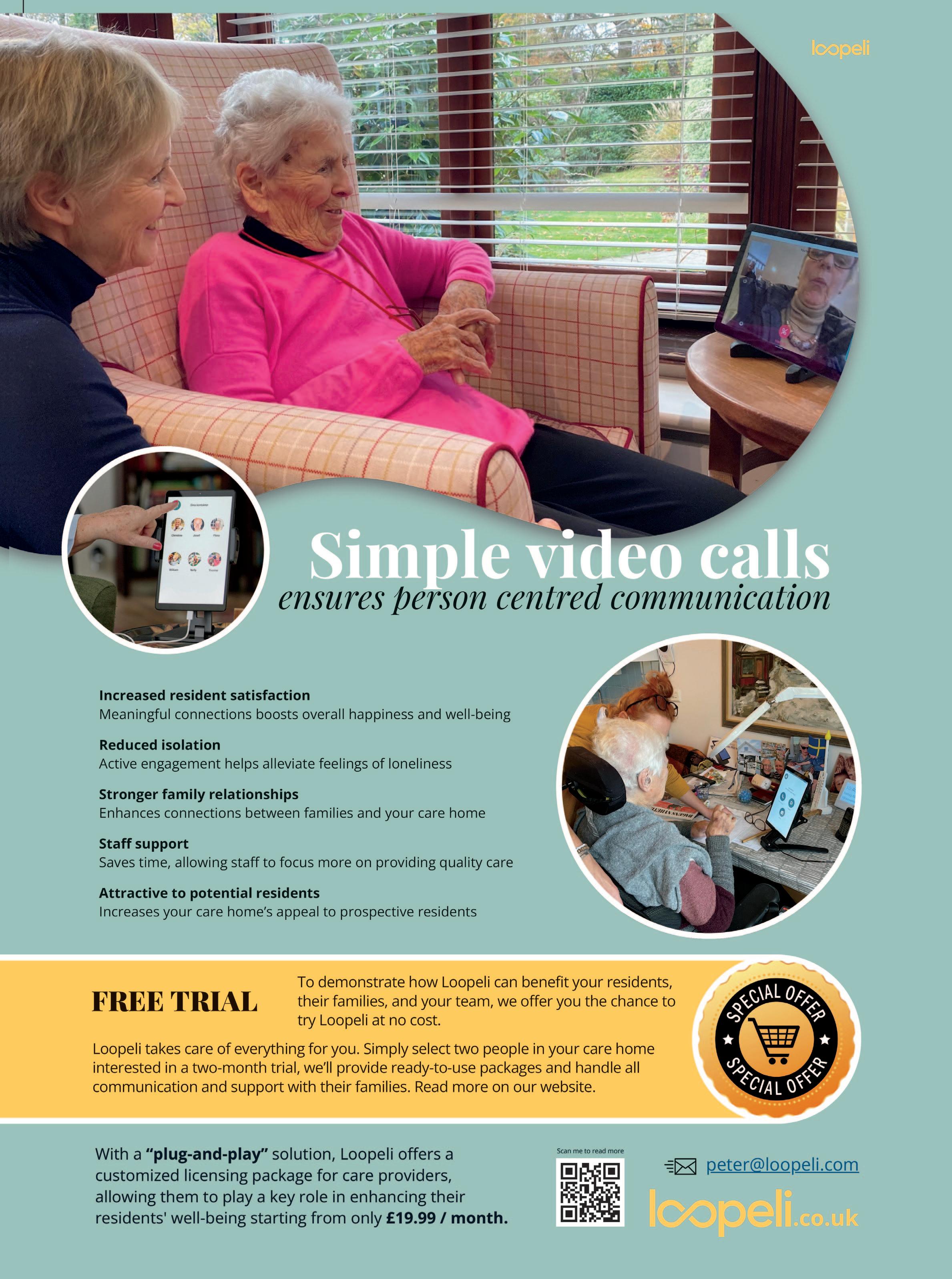
PASS supports over 1,000 care providers every day, giving them access to market leading care management tools hand in hand with unlimited 24/7/365 support from our dedicated and friendly PASS team.

Assured by NHS Transformation Directorate, PASS provides a secure platform that allows you to plan, record and evidence the care you deliver. The only assured solution built specifically for the home care sector, it provides comprehensive real-time functionality and allows you to share progress against outcomes with customisable, exportable reports.
CARE PLANNING AND ROSTERING FROM A SINGLE PLATFORM
To meet the wider needs of the PASS community All-in-one PASS
has recently been launched , bringing advanced rostering functionality to our established digital care planning platform. As a result advanced staff scheduling, payroll and invoicing functionality is now seamlessly linked with care planning and reporting, reducing the technical complexity, risk and overhead associated with integrating two separate systems.
As a result, PASS now provides an all-in-one suite of digital care management tools, available from a single platform, designed to:
Save you time
• Increase the efficiency of your teams
Improve the quality of care
• Deliver better outcomes

Our commitment to the continual evolution of PASS is further illustrated by the addition of GP Connect. The first product of its type to offer this feature, PASS is still one of only a handful of digital care management solutions to have completed this NHS Digital integration, and
is the only one offering it to the home care market.
PASS GP Connect provides authorised social care staff with realtime access to their client’s GP records. It makes medical information available when and where it is needed, leading to improvements in both care safety and outcomes:
• Visibility of allergies, vaccinations and medications, especially useful for clients unable to reliably share their personal information
Using medical information to inform care planning
Ensuring that the right medication is delivered to the right person in the timeliest manner. In one case, this allowed the administration of antibiotics on a Friday evening, aiding the service user’s swift recovery from infection
Available to all PASS users at no additional cost, PASS GP Connect is significantly more efficient than waiting for a GP response. It’s also a positive step forward on the path to the DHSC’s goal for widespread digitally enabled care and is in full alignment with their ambition for joined up care for everyone.
Get in touch: www.everylifetechnologies.com
hello@everylifetechnologies.com
Our domiciliary care sector is facing serious challenges with workforce shortages, rising costs, and an ever increasing demand for home-based care. Technology must be part of the answer, however the low adoption of smartphones and tablets by older adults has only highlighted the need for a different approach.
We believe the solution lies in the most common, and most familiar technology: the TV.
SIMPLIFYING COMMUNICATION
Many elderly individuals find smart-screen gadgets intimidating, but TVs are familiar. By delivering video calls through the TV, care providers can offer simple, accessible communication. Routine check-ins can be conducted virtually, reducing the need for some physical visits while maintaining personal connection. Family members can be more involved, offering reassurance and better support.
PROACTIVE MONITORING WITH SENSORS AND CONNECTED DEVICES
Internet of Things (IoT) devices, such as motion sensors, health monitors, and smart medication dispensers, provide real-time data on an individual’s health and environment. For instance, sensors can monitor wellbeing (e.g. sleeping patterns), or poorly regulated heating in the home. These insights allow carers to respond proactively.
BOOSTING EFFICIENCY AND PROMOTING INDEPENDENCE
Video calling reduces the need for unnecessary travel, enabling carers to focus on urgent or high-priority cases. IoT alerts further optimise resource allocation, helping providers manage workloads effectively. At the same time, this technology empowers clients to live safely and independently at home, aligning with the UK’s focus on “aging in place” and person-centred care.
HOMESIGHT IS THE WAY FORWARD
Our HomeSight system is the first to use the TV for health and wellbeing support . It’s an incredibly simple system, easily connecting to any TV with an HDMI port (which almost all TVs have), blending
seamlessly into the home. With an ergonomically designed remote control and a user-friendly TV interface, it’s intuitive enough to require almost no training. With two presses clients can connect with carers or family members effortlessly.
It ensures accessibility for all ages and technical abilities while maintaining the familiarity of using a TV.

Beyond video calls, the system keeps everyone in the loop. Family members can use dedicated phone apps to stay connected, while carers access a secure web portal for real-time updates and communication. This integration ensures that clients receive the care and connection they need without disruption to their daily routines. It’s a practical, stress-free way to enhance support and communication in domiciliary care.
For further information, see the advert on the facing page or visit www.atsolutions.uk






At AFG, our aim is simple – to help those we support live more independent lives. Technology is becoming more integral to helping people with a learning disability or with autism to be more independent. But while the technology exists today, the challenge for tomorrow is scaling its adoption across health and social care.
THE STATE OF THE MARKET: TECHNOLOGY IN SOCIAL CARE
The potential for technology to enhance lives in the care sector is evident. But many people who could benefit lack access to the tools that would make a difference to them.
According to a report by Ofcom, people with learning disabilities are less likely to own computers and smartphones or use of the internet than non-disabled people[1].
At AFG we established our Technology Lending Library two years ago. This simple idea has had a positive impact on many of the people we support. For example, borrowing a tablet device enables someone who is non-verbal to communicate with their family and friends. Another person was supported to watch videos that gave them the confidence to attend the dentist for the first time in years.
SCALING UP: MOVING BEYOND
All this is worthwhile. But for real change in social care to happen, we need to be able to scale up technology within our sector and integrate it into the way we live, work and play.
At AFG, we have partnered with assisted living technology experts, My Ecosystem to take a holistic approach that combines health, care and housing.
Led and funded by Lancashire County Council, several bungalows at our 24-hour supported living housing in Parklands Court in Lancashire have been retrofitted with bespoke, industry-first technologies, including sensors, communication devices and health monitoring tools. This set up not only supports residents, but also aids those supporting them too in delivering the right care, at the right time through real-time monitoring and adjustments.
By Andrew Kendall, Chief Commercial Officer at Alternative Futures Group
However, this is one of few examples of such integration. To make this approach accessible on a broader scale, we need to develop the right model so that the right assistive technology becomes a natural part of someone’s support.
The impact of personalised, integrated technology on both the individuals and the wider health and social care sectors can be transformative. By reducing pressure on the NHS and local authorities, this approach brings real value to users while creating efficiencies and cost savings across the sector.
So, what needs to happen to make this model work on a national level? What do we need to do as a sector to understand how we do this and how it gets funded and paid for?
Firstly, we need clear evidence of what works in what situation (depending on the person, their home and the community) and what doesn’t. What are the costs and the benefits (financial and non-financial)?
Secondly, there needs to be more education and knowledge sharing of the wide range of assistive technologies that are available for people with a learning disability and autism – this covers consumer technology, specialist standalone technology, telecare approaches and connected ecosystems. And what skills do we need to assess needs and ‘prescribe’ the right technology?
Thirdly, we need to be working together across systems and organisational boundaries to make the best use of technology. Social care, health and housing need to work around the shared goal of achieving better outcomes for people and helping them be more independent.
Fourthly, we need to build assistive technology into how support is commissioned and provided. New homes should come with a base ecosystem in place that can be added to according to the specific needs of the individual living there.
There is no doubt that technology is going to change all our lives in the future. However, as health and social care professionals we have a responsibility to those we support – in our case those with learning disabilities and mental health conditions – to ensure that they are prioritised rather than left behind in this technological evolution. By taking a thoughtful, systematic approach to technology in health and social care, we can empower those we support to live more independent, fulfilling lives.
Residents can continue to have traditional big button telephones in their rooms but with shorter contracts, free calls and no cabling.
GHM Care has launched a new resident telephone service that not only future proofs residents for the Analogue Switch Off but uses the latest in digital technology to avoid cabling and unpopular long-term contracts.
The new IP telephones from GHM Care bypass the need for a physical telephone line and instead use the internet to make and receive calls.
Residents can access rolling 30-day contracts for the first time ever, get free calls and the big button phones arrive fully configured by GHM Care.
Care homes don’t pay anything for the service and can offer the new service to residents without worrying about cabling or structural work. Homes just need to provide a power supply and WiFi connection for the phones to work.

Residents and their families are able to order handsets directly, removing any admin or maintenance for the care home.
Neil McManus, Managing Director of GHM Care says: “Traditional landlines for residents are often expensive with minimum contract lengths of twelve months. This has long been an issue for residents and their families.So, we’ve developed a solution that capitalises on the latest digital technologies to deliver a better solution for both residents and care homes.
“Residents and their families are really appreciating how easy the handsets are to set up and use, as well as the freedom of short-term contracts.
“Care homes are delighted to finally have a solution where the day-to-day handling and installation doesn’t impact their buildings or resources, and they’re able to offer an even better service to residents.”
Care homes can find out more at ghmcare.co.uk/Services/resident-telephones.
Training care home staff is vital for delivering high-quality care, especially when managing complex resident needs such as dementia, frailty, and mental health challenges. However, traditional methods often fall short in engaging staff, leaving critical gaps in understanding and preparedness. Innovative approaches, such as game-based learning and peer-to-peer collaboration, are revolutionising training, particularly in addressing the ethical and legal challenges of restrictive practices.
Restrictive practices—measures that limit an individual’s freedom—are sometimes necessary to ensure safety. However, they must be applied with great care, adhering to legal frameworks and ethical guidelines to protect residents’ dignity. A groundbreaking digital training resource, co-designed by Queen’s University Belfast and Focus Games, exemplifies this innovation. The resource uses interactive, expert-driven content to help staff navigate restrictive practices responsibly and effectively.
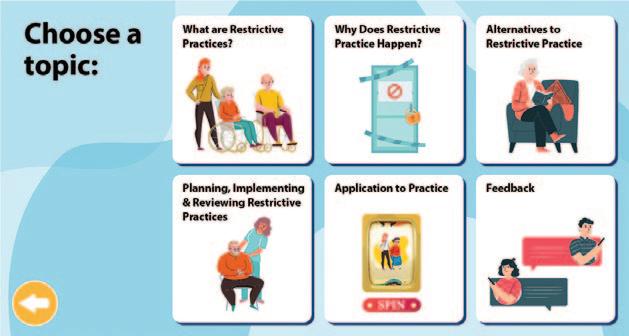
Game-based learning plays a central role, transforming topics like restrictive practices into engaging, real-world scenarios. Simulations allow staff to explore ethical dilemmas, practice
The delivery of safe care is the paramount responsibility of social care providers. Central to achieving this is the governance framework adopted by service providers. And at the core of this framework are policies and procedures. These enable the provider to comply – and evidence compliance – with relevant legislation and regulations, as well as facilitating best practices, supporting business needs, and assisting in recognising and managing risks.
Providers have a legal duty of care to the people they employ. Policies and procedures should provide clear guidelines to staff on how the organisation operates, as well as informing them of best practices and processes to be followed.
Policies should be reviewed annually as a minimum to ensure they are still fit for purpose and align with legal and regulatory requirements. They should be reviewed not only by employees of the business, but also by experts in various subject matters (e.g., infection control or medicines management).
For many small- to medium-sized providers, there may not be the in-house skills, knowledge, and experi-
decision-making, and test alternative solutions in a safe, low-pressure environment. This approach enhances critical thinking, teamwork, and retention of essential knowledge.
Peer-to-peer learning further strengthens the training by encouraging staff to share experiences and insights, fostering collaboration and practical problem-solving. This creates a dynamic learning environment where staff feel supported and empowered to deliver compassionate care.
By integrating these modern approaches, care homes can elevate training into a meaningful experience, equipping staff to balance safety with residents’ autonomy and dignity. At Focus Games, we are proud to offer tools designed to empower care home teams through innovative training. Visit www.FocusGames.com or email info@focusgames.com to learn more about our Restrictive Practice resource and how it can enhance care home outcomes for residents and staff alike.
For further information see the advert on the front of this issue or visit www.focusgames.com
ence to complete such a robust annual review. Many choose instead to purchase their policies and procedures from a reputable provider like W&P Compliance & Training, who will also complete reviews and ensure their policies and procedures remain up to date. This way a provider not only ensures they remain compliant; they also benefit from best practice policies and procedures that provide a solid foundation for safe working practices and – ultimately – protect and support service users and staff.

Diplomas have the potential to empower individuals and are the best route for most health and social care professionals to progress, according to an expert at leading training provider Realise.
Lesley O’Connor, Head of Health and Social Care at Realise, said diplomas are a strong option as they are flexible, can usually be fully funded and can be tailored to the particular needs of the employer and the learner.
Diplomas are also attractive to employers as they require little administration.
Lesley said: “I think there is still a lack of awareness and some misconceptions around diplomas. Sometimes people believe apprenticeships are their only option and they don’t realise diplomas are available under funded provision for those who are eligible.
“Some employers also mistakenly believe that diplomas are completed entirely online but, in fact, they are very hands-on and practical. This approach helps learners apply theoretical knowledge directly to real-world scenarios, which is a major advantage.
“Our diplomas are recognised and trusted by employers in the health and social care sector. They meet national standards, which means learners hold a qualification that is valued and trusted.
“If a candidate does not meet the eligibility criteria for a diploma, then alternative routes will need to be explored. Otherwise, I would nearly always recommend a diploma as a fantastic way to expand knowledge and skills.”
Under the Adult Skills Fund, diplomas are usually fully funded for anyone aged 19 and over, as long as they have lived in the UK for three years. There are some other eligibility requirements in devolved areas – and in some areas, workers from overseas can start a diploma as soon as they arrive in the country under a Health and Care Worker visa.
Learners can also qualify for funded diplomas if they earn below the low wage thresh-

old, which varies from area to area. The thresholds have recently been raised in various authorities, to £35,000 a year in Liverpool, for example, and £27,500 a year in West Yorkshire.
Realise offers Level 2 diplomas in all non-devolved regions for England and Liverpool City Region.
The provider also offers Level 3 diplomas in West Yorkshire, Liverpool City Region and West Midlands.
A Level 2 or 3 diploma is equivalent to achieving GCSE grades 9, 8, 7, 6, 5, or 4 previously graded A*, A, B, or C.
There are no formal maths or English tests at the end of the diploma, though development is encouraged throughout the programme.
Realise works with employers to develop diplomas that are bespoke and built around the six specialisms: Elderly Residential Care Services, Dementia Care Services, Learning Disability Care Services, Treatment and Recovery Care Services, Mental Health Care Services and Community Care Services.
Lesley said: “Tailoring our programmes is extremely valuable as it ensures the skills being developed are relevant to the role the learner holds. It helps them to develop in the areas they are most interested in which, in turn, leads to an enjoyable learning experience.
“Helping learners find the right programme for them is central to the Realise ethos. Some learners will be able to enter at Level 3 if they’re in the right job role, even if they don’t have another diploma.
“Anyone who is interested can talk to us and we will advise on the most appropriate programme.”
To find out more, visit www.realisetraining.com

Apprenticeships in the adult care sector provide a vital opportunity for professionals to advance their careers, develop leadership skills, and contribute to improving care standards. These programs, including Level 4 Lead Practitioner and Level 5 Leader in Adult Care, offer a structured pathway for care workers to step into higher-responsibility roles. By equipping individuals with the knowledge, confidence, and expertise needed to take on leadership positions, apprenticeships play a critical role in fostering both professional growth and better outcomes for service users.
These advanced apprenticeships go beyond acquiring qualifications. They enable care professionals at foundational levels to build essential skills such as critical thinking, problem-solving, and effective communication, preparing them for senior roles in the sector. This emphasis on personal and professional development
not only helps individuals achieve their career aspirations but also strengthens the workforce as a whole. The benefits extend to employers, who gain skilled and motivated teams by supporting staff through these programs. Investing in leadership development helps organisations improve retention rates and build a robust pipeline of future leaders, contributing to stability and high performance within care settings. Apprenticeships also provide clear guidance for newcomers to the sector, offering resources to help them understand career pathways and qualification requirements. This makes apprenticeships an excellent starting point for those beginning their journey in adult care, as well as a powerful tool for existing professionals seeking to advance.
By focusing on continuous learning and leadership development, apprenticeships in adult care empower individuals to unlock their potential while ensuring high standards of care across the sector. For employers and care professionals alike, these programs are a cornerstone of growth, innovation, and excellence in the industry. Find out more about our apprenticeships on www.paragonskills.co.uk
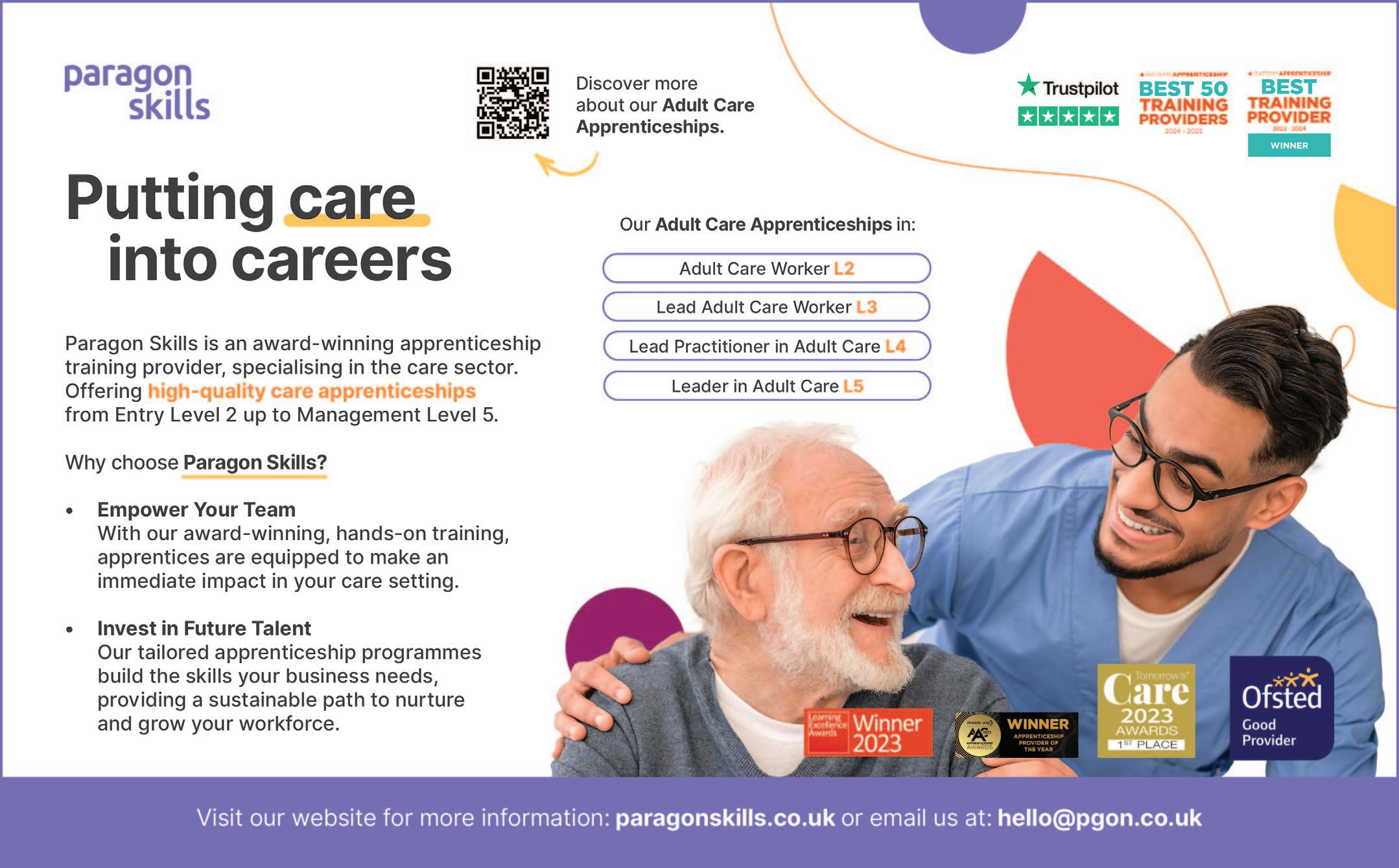
By Daniel O’Shaughnessy, Programme Manager

In an era where healthcare data is one of the most sought-after digital assets, care homes, nursing facilities, and NHS establishments are increasingly at risk of cyberattacks. With the sensitive and life-critical data they handle daily, a breach can have devastating consequences not only for the facilities but also for the people they support.
But there are steps that you can take to reduce the risk and impact of a successful attack, and to respond quickly if an attack occurs.
It is absolutely critical to have a business continuity plan which covers what you will do if digital systems are out of order. Digital Care Hub’s business continuity guide and template plan says:
Don’t assume you will be back to normal in a few days – plan for longer periods of time.
Test your plan. This is crucial, as there is no real way of knowing your plan
works if you don’t test it.
Consider vulnerabilities specific to your business type and structure. Make sure these are included in your plan.
Ensure you have a data security protection lead in place – this doesn’t have to be a specific job title. It can be a responsibility of an existing employee.
During a live attack, care providers should:
Look at your security software to see if you are able to identify the specifics of the attack. If you are unable to do this (but you know which device has been affected) run your antivirus programme. If nothing is found, consider using an alternative antivirus programme. Do not turn off your computer. Log-off (not shut-down) the computer and ensure no-one uses it. Quarantine the computer by removing the network cable or put it in ‘airplane mode’. Secure any memory discs/CDs/DVDs or other media connected to the computer.
Check who else has been affected, speak to your software supplier(s) to find out whether they are reporting similar incidents.
During the recovery phase, you should:
Follow your business continuity plan. Ensure you always have access to a ‘grab-bag’ of key documents necessary to respond to an incident. Work
of the fraudsters and criminals of the world. In this guide we will look at a checklist of things you need to consider to protect your business.
BACK UP YOUR DATA
Backup your data, and importantly keep the backups physically away from the computer on a separate (but secure) media such as a USB key. See below about encrypting.
PASSWORDS
Set your systems to disallow weak passwords, and mandate regular changes.
Multi-factor authentication
This will secure access to your systems using your personal mobile phone or a security device. It stops attackers who have hacked any password.
CYBER SECURITY AND INCIDENT PLANS
Plan out your approach. Don’t try to work things out on the day…take a look at the other article in this feature for more details.
PRIORITISE SOFTWARE UPDATES
Providers of commercial software will generally supply updates and fixes that are designed to fix security holes so they cannot be exploited. It’s vital to install these as soon as you get them.
ACCESS CONTROLS
Setting up your IT to secure access to both the systems and the data by separating who has access to what. Your IT supplier can do this if you aren’t sure.
EMPLOYEE TRAINING/PROCEDURES
Many attackers will use trickery (Phishing) to manipulate people into making mistakes and opening your systems. There are countless ways of doing this; don’t rely on your staff always recognising an attack. Strict procedures and training combat this. Look at how your finance staff do business and use fixed, written procedures to ensure they don’t fall for anyone or thing.
with your IT suppliers and IT support to identify the nature and scale of the issues. I
Recover hacked accounts. Check suppliers’ websites for details on how to recover hacked online email, social media or bank accounts. Check your own email account to see if forwarding rules have been set up by hackers. Change passwords. Log all devices and apps out. Set up multi-factor

INSTALL SECURITY SOFTWARE
Having suitable security software installed is vital. By this, we mean anti-viral software and system tools to keep your systems clear. You should have:
• Email Security & Threat Protection
• Cyber Fraud and Phishing Defence
• Content Filtering DATA ENCRYPTION
Always ensure that any data stored in your IT systems is encrypted both at source and in transit. Don’t forget your backups!
SECURE YOUR MOBILE DEVICE
If you keep company data on it, using MDM software is a great plan. You can set rules and administer each device to be sure that they are compliant with security protocols. www.sescomputers.com sales@sescomputers.com +44 1305 820300






Background checks are vital to the healthcare industry, ensuring that only qualified, trustworthy, and compliant individuals are hired, directly influencing both patient safety, outcomes and the organisation’s credibility. It's important to emphasise that these requirements apply to all staff in health and social care services, including volunteers, and agency workers.
However, new statistics have revealed that 20% of healthcare candidates in the UK fail a background check, highlighting that the industry at times struggles to find candidates that are a perfect fit.
With the stakes so high, ensuring that healthcare professionals meet the highest standards of integrity and competency is more important than ever. But how can employers take proactive steps to protect vulnerable individuals from harm or exploitation, ensuring they hire only candidates with the necessary qualifications and experience?
The first step employers can take is conducting comprehensive background screenings, following regulations set by the Care Quality Commission (CQC). The way employers can ensure best practices include establishing clear vetting policies, training staff on these protocols, and regularly updating screening processes to maintain compliance. These
checks typically encompass criminal record reviews, identity verification, proof of qualifications, UK right-to-work assessments, and enhanced Disclosure and Barring Service (DBS) checks.
However, our statistics show less than one-in-ten healthcare businesses check whether a candidate is on a sanctions watchlist or identified in adverse media checks, and no organisations are running social media background checks. While CQC regulations ensure that candidates have the right skills, these additional checks are crucial preventative measures that help ensure the staff being hired are not only qualified but also the right kind of people for the role, safeguarding both patients and the safety and happiness of existing staff.
By following the strict guidelines laid out by CQC, healthcare organisations can protect their staff members and those receiving care from potential harm or exploitation. While also ensuring their brand doesn’t face any reputational risk.
In the UK, healthcare organisations most frequently verify a candidate’s criminal history (66%), references (60%), address (59%), and right to work certification (56%). These checks are essential for ensuring compliance with regulatory requirements, helping protect organisations from potential fines or legal action due to non-compliance. More importantly, maintaining high standards of care and safeguarding patient safety not only helps meet these regulatory requirements but also boosts the organisation’s credibility, fostering trust among patients, families, and the public.
Failure to comply with these guidelines can lead to reputational damage, eroding trust in the provider’s ability to deliver safe and effective care. Additionally, non-compliance with CQC requirements can result in severe
By Luke Shipley, CEO and co-founder at Zinc (www.zincwork.com)
penalties, including fines, legal action, and even the revocation of a healthcare service’s licence. This only highlights the importance of verifying candidates thoroughly – ensuring that these checks are done to the highest standard, and conducting regular rechecks on existing staff to ensure the safety, trust, and integrity of the healthcare institution is maintained.
LEVERAGING TECHNOLOGY FOR EFFECTIVE SCREENING Technology, specifically automation, plays a critical role in enhancing the speed, accuracy, and compliance of background checks, enabling healthcare providers to safeguard patient welfare more effectively. By automating and streamlining the background verification process, technology can provide a helping hand to organisations to meet the CQC standards efficiently, even in a fast-paced and evolving healthcare environment.
Automation of background checks can provide real-time data access from one unified dashboard, using this, healthcare providers can quickly identify red flags and assess candidates more accurately. Automation tools can also provide candidates with real-time updates on the status of background checks so they have visibility and aren’t left in the lurch wondering where things are at.
By utilising screening technology, businesses can offer a screening process that is efficient and easy to use for both candidates and their hiring teams. Moving at pace means businesses can reduce the wait time from offer to start date, ensuring they don’t lose candidates to competitors throughout the process and bringing forward start dates where possible. Ultimately, leveraging technology not only improves operational efficiency but also ensures that providers maintain high standards of care, protecting both patients and the organisation’s reputation for years to come.


The care sector in the UK is facing an unprecedented crisis, with an 82% drop in visa applications for health and social care roles since July 2023 according to the latest figures from the Home Office. This sharp decline is a direct result of the government’s recent policy changes, notably the ban on overseas care workers bringing family dependents. For many potential applicants, this restriction makes the UK a less attractive destination, especially for those unwilling to face prolonged separation from their families.
However, the decline in overseas care workers is not solely due to this policy. The cost-of-living crisis in the UK has further compounded the problem. Many care workers, who are often paid at the lower end of the salary scale, struggle to make ends meet on a single income. The inability to bring a second household income from a spouse or partner makes the financial realities of living in the UK even more daunting, discouraging many from applying. This situation is exacerbated by rising costs for essentials such as housing, utilities, and food, which significantly erode the disposable income of lower-wage workers.
Also contributing to the reduction in visa applications is the increased scrutiny and compliance demands placed on employers by government. Since late 2023, the Home Office has intensified its oversight of sponsorships in the care sector, resulting in lengthy processing delays and burdensome evidentiary requirements. Employers are now required to submit extensive documentation, including rotas, contracts, and staff details, often with very little notice. These demands have overwhelmed many care providers, leading to delays in hiring and, in some cases, the suspension or revocation of sponsor licences. The increased frequency of compliance visits has further strained employers, who are already struggling to maintain adequate staffing levels. Home Office visits can lead to significant disruptions in business operations, especially if they result in the suspension of a licence, which halts all further sponsorship and delays pending visa applications.
The impact of these issues on the care sector is profound. With a large number of vacancies remain-
ing unfilled, the sector is struggling to provide essential services to vulnerable people. Despite some arguments that the drop in visa applications could reflect a “natural correction” following the initial surge in demand when the sponsorship system first opened to care workers, the persistent high vacancy rates suggest that the need for overseas workers remains critical. The combination of restrictive immigration policies, economic challenges, and increased regulatory burdens has created a perfect storm, which threatens the ability of care providers to meet the growing demand for services.
To navigate these challenges, care providers must take proactive steps. Employers need to ensure they have adequate resources to manage their sponsorship and Home Office interactions and it is crucial they remain vigilant of any abuse or mismanagement of the system and workers. Engaging legal representatives to assist with visa applications, compliance visits, and licence management can help mitigate risks and ensure businesses remain in good standing with the Home Office.
Additionally, adopting robust recruitment practices and providing comprehensive support to overseas workers—such as assistance with accommodation, training, and relocation expenses—can help enhance retention and attract talent. Despite the recent increase in visa salary thresholds, care workers still benefit from discounted rates under the Immigration Salary List.
Looking to the future, while the government is planning to build a domestic workforce, such as through Labour’s Fair Pay Agreement and the launch of Skills England, these initiatives are unlikely to have immediate results. It could take years to train and recruit enough domestic workers to fill the current gaps in the care sector, so the reliance on foreign workers will likely continue. To ensure that care providers can maintain services during this transitional period, it is crucial that the visa system is adapted to better support the sector’s needs.
It is clear that the care sector in the UK is at a critical juncture. The combined pressures of restrictive immigration policies, economic challenges and regulatory burdens have led to a significant reduction in the number of overseas care workers, jeopardising the sector’s ability to meet demand. By taking proactive measures and advocating for supportive policy changes, care providers can navigate these challenges and continue to provide essential services to those in need.

bers and care home staff cannot fulfil this role. We eliminate this obstacle, providing a seamless and stress-free solution.
Our friendly and knowledgeable team guides both donors and attorneys through the entire process of applying for and registering an LPA, making it straightforward and accessible. With affordable and transparent pricing, we ensure this vital service is within reach for everyone.
We are eager to collaborate with care providers and build lasting partnerships. Our referral package is designed to add value to the care experience while supporting your residents effectively.
residents is securing a Certificate Provider, as family mem-
To learn more about how we can work together, please contact Malcolm Roberts on 01228 307360 or email malcolm.roberts@lpanow.com
Swift Management Services Limited provide expert support through a network of highly experienced healthcare professionals who have many years of working within the health and social care sector. These include nurses, care managers, Registered Managers, Operating Theatre staff, & ITU staff.
The team is able to provide holistic support packages ranging from a short term improvement project to substantial change management programmes including interim staff where required. Our innovative action plans which are tailored to your specific service requirements are interactive and are held on our secure server for ease of access. These have proven especially popular with CQC as it is easy to evidence progress and improvements through our ‘You said- we Did’ information programme.

We can deliver training sessions in person or remotely using a variety of platforms that are designed for your service.
We can support your service through a crisis or on an ongoing basis with our retained consultancy service package, providing regular one to one coaching and development, quality monitoring reviews, mock KLOE inspections, unlimited telephone and email support tailored service improvement plans and access to a dedicated care consultant to work in partnership with you to drive sustainable improvements. Swift Management Services Limited can create staff friendly bespoke policies and procedures for you as required to help you achieve compliance.
Tel: 020 8087 2072
Email: info@swiftmanagement.org.uk
Website: www.swiftmanagement.org.uk
Global assists clients throughout the U.K. who specialise in the healthcare sector to achieve their objectives of purchase, development and refinance.
We have organised over £1.8bn for clients in the past 30 years, providing clients with competitively priced funding to refinance existing debt, ease cashflow and develop businesses further. From helping clients make their first purchase through to allowing groups to grow significantly in size we

assist at every stage of your business expansion. Every proposal is individual and deserves to be treated that way, so we hope you will allow us to be of assistance to you and call us to chat through your plans and requirements, I am sure we will be able to tailor a facility to your requirements. Call us on 01242 227172 or e-mail us at enquiries@globalbusinessfinance.net



